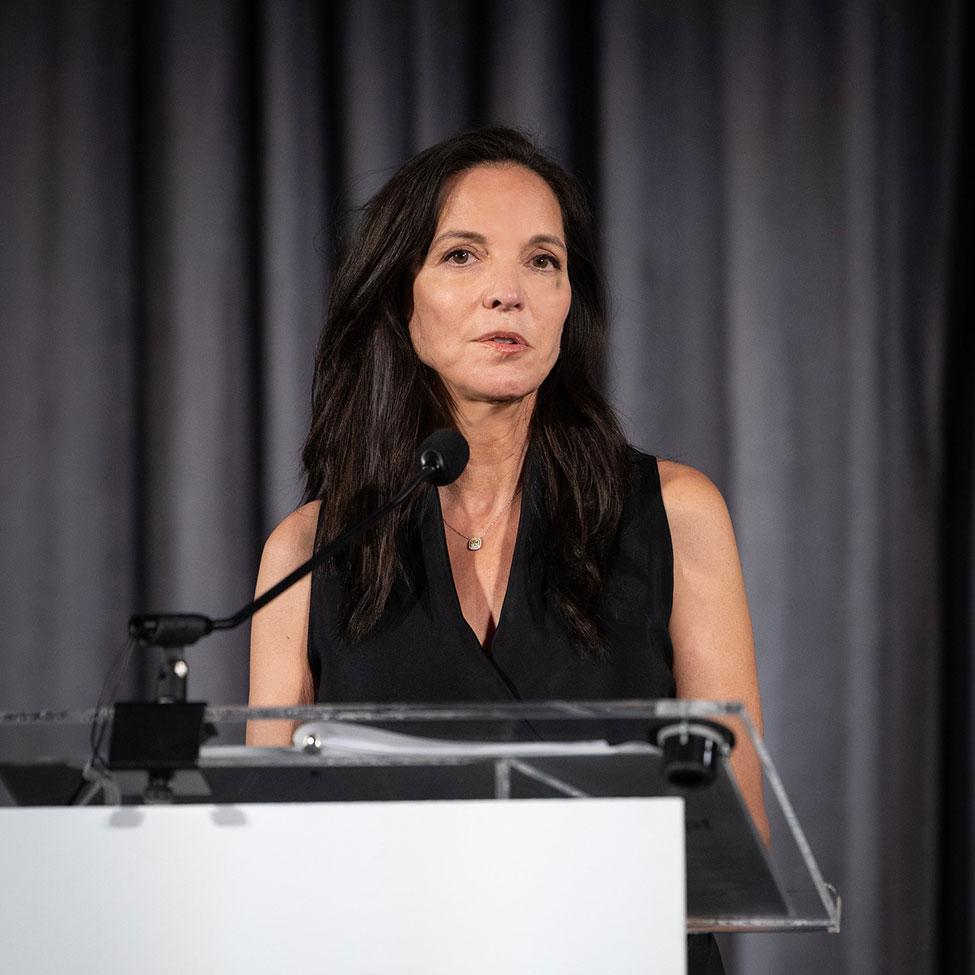
Honoring Trailblazing Pace Alumni
During the 61st annual Spirit of Pace Awards dinner held on June 12 at the American Museum of Natural History in New York City, Pace University honored two outstanding alumni leaders who, through their steadfast generosity and trailblazing industry leadership, have translated the lessons of their Pace experiences into lifetimes of philanthropy, innovation, and impact.
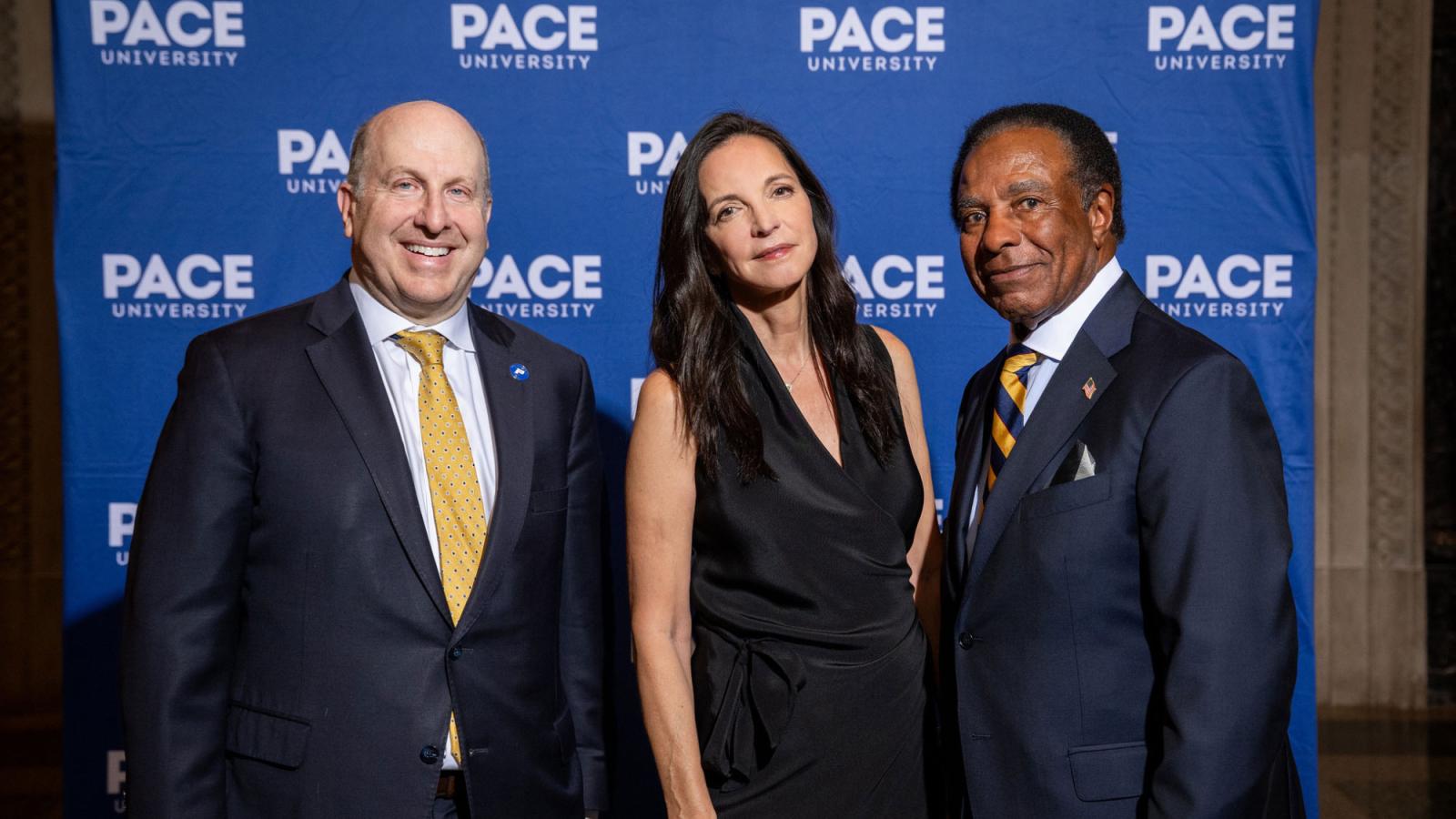
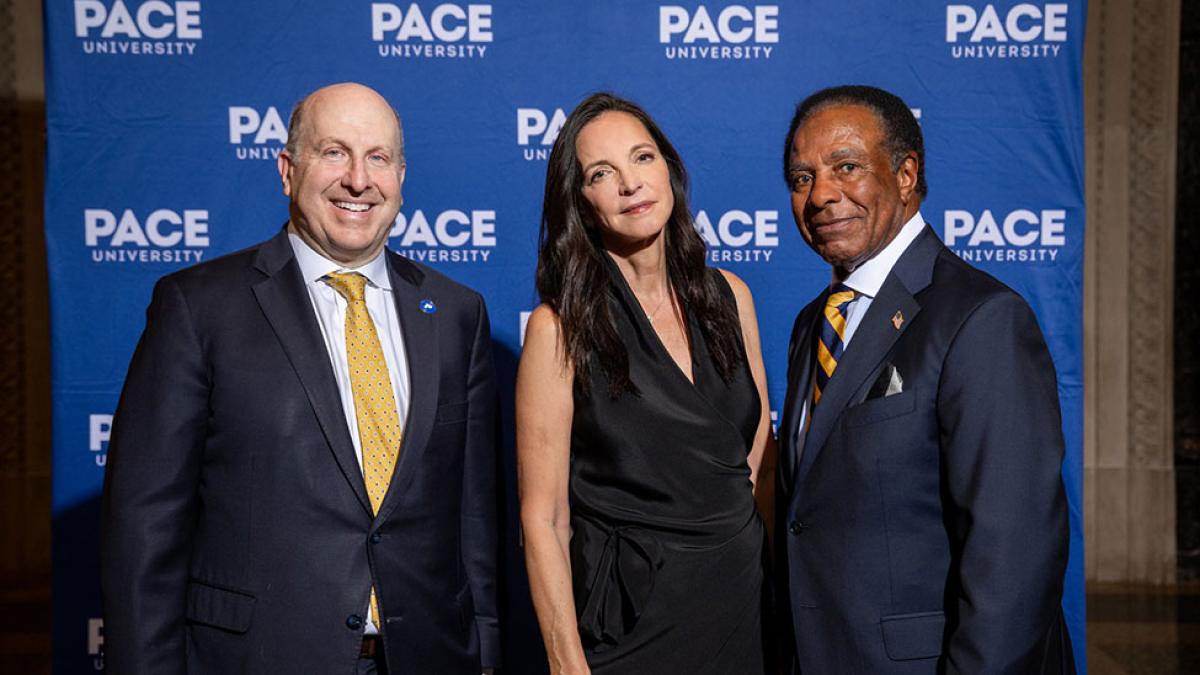
During the 61st annual Spirit of Pace Awards dinner held on June 12 at the American Museum of Natural History in New York City, Pace University honored two outstanding alumni leaders who, through their steadfast generosity and trailblazing industry leadership, have translated the lessons of their Pace experiences into lifetimes of philanthropy, innovation, and impact.
Kristin A. Dolan, MS '90, chief executive officer at AMC Networks, and John Lyle ’66, philanthropist, were two of four outstanding honorees celebrated during this year’s Spirit of Pace Awards ceremony—the University’s signature annual fundraiser for student scholarship and program support. As alumni, Ms. Dolan and Mr. Lyle’s participation was especially meaningful, underlining the wide-ranging successes of Pace graduates across fields and industries and the ways those success can be powerfully channeled toward transformative support of the University, our mission, and the students whose inexhaustible energy and ambition bring that mission to life.

Ms. Dolan, who graduated from Pace with a master’s in publishing, was honored by Pace University with the 2025 Leaders in Management award, a recognition of industry pioneers whose achievements in business and service have enhanced the civic and cultural tapestries of communities in New York City and across the country. During her acceptance remarks, she discussed the vital role Pace played as a launchpad for her remarkable career success.
“Before coming to Pace, I graduated from SUNY Albany with a BA in English and a minor in business,” she said. “My goal after graduation was to find a career that combined my love of literature with something that could actually generate income, so I was thrilled to discover that Pace had launched a Master of Science program in publishing, which seemed like a great next step in my academic journey. The access Pace provided during my time there led to a full-time role in marketing at Rainbow Media following graduation—the first step on the path to where I am today.”
As CEO of AMC Networks, a global entertainment company and home to many of the greatest stories and characters in the history of TV and film, Ms. Dolan oversees a portfolio of distinct and award-winning targeted streaming services, cable networks, and film distribution labels; AMC Studios, the company’s in-house studio, production, and distribution operation; and AMC Networks International, its international programming business.
In a previous role as COO of Cablevision Media, Ms. Dolan as a key member of the leadership team that oversaw Cablevision’s 2016 sale to Altice USA for $17.7B, the highest revenue multiple in the history of telecom. Today, she is a member of a member of the Board of Directors for The Internet & Television Association, The Paley Center for Media, The Syndeo Institute at The Cable Center, Sphere Entertainment, and The Wendy’s Company (in addition to serving on Wendy’s Audit, Nominating and Governance and Technology Committees). She also serves on the President’s Councils for both Pace and the University of Albany.
“I’ve always believed that a liberal arts education provides so much value to aspiring leaders in any field,” she said, “and I’m proud to be an alumna of a well-respected university like Pace, which takes such pride in their curriculum and the resulting success of their graduates.”
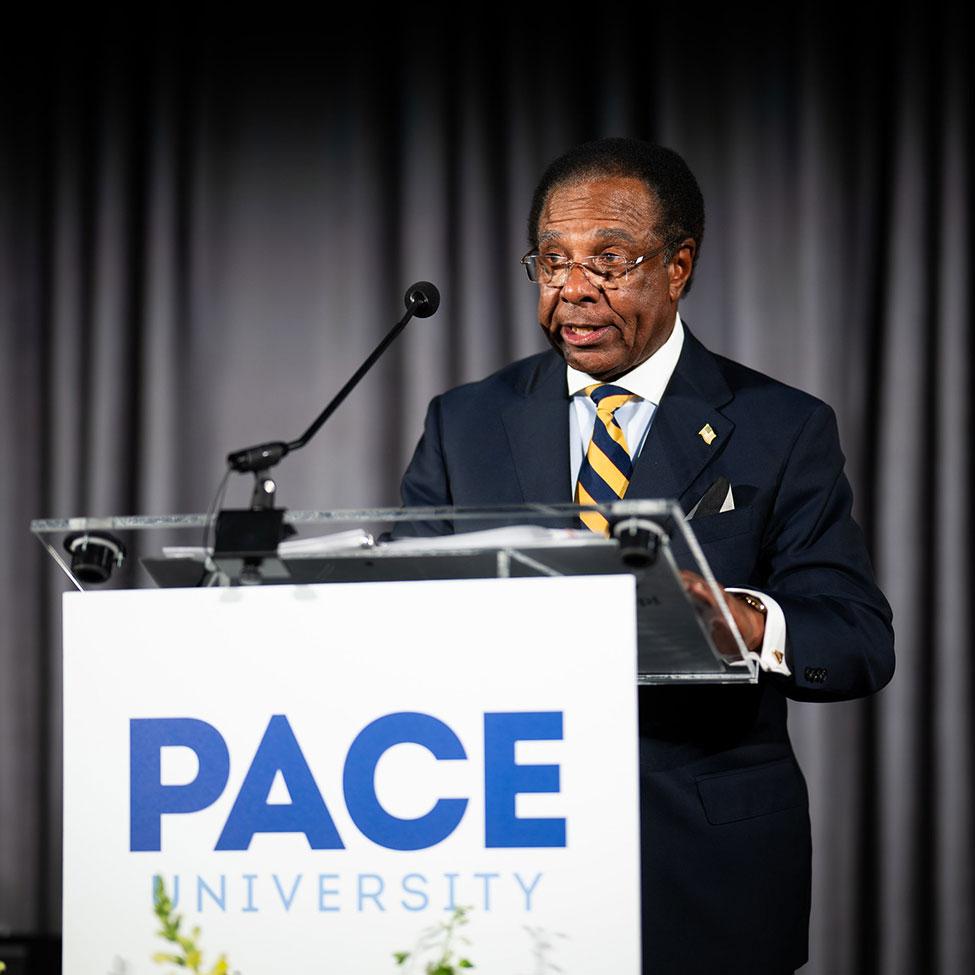
Mr. Lyle, who graduated from Pace with a BBA in marketing, received the 2025 Alumni of the Year award, recognizing his commitment to excellence, his profound belief in the importance of uplifting others, and his extraordinary record of philanthropic investment.
Over more than 40 years of generous support of the Pace mission, Mr. Lyle has distinguished himself as among the most dedicated and impactful individual benefactors in the history of the University.
A native of Jamaica, Mr. Lyle enrolled at Pace in 1963 on the recommendation of friends in his adopted home of New York who advised him of the University’s exceptional business programs and strong track record of career placement. While in school, Mr. Lyle drew inspiration from the visionary leadership of legendary Pace President Dr. Edward J. Mortola, as well as key professors such as Dr. Seymour Baranoff and Dr. Thomas Edward Sayles. According to Mr. Lyle, it was Pace’s combined focus on business principles and a broad liberal arts education that prepared him to lead a life of leadership, professional excellence, and intellectual curiosity.
“This great institution has been equipping and preparing students to take their place in society for almost 120 years,” Mr. Lyle said during his acceptance remarks. “The students are given the fundamentals and essentials so they can be successful.”
Mr. Lyle began his long and successful career with the United Parcel Service while still a student at Pace. He later went on to rise through the UPS management training program, where he gained experience in operations, industrial engineering, human resources, and more. By the time of his retirement from UPS in 1996, Mr. Lyle had participated in business development in the western United States, Canada, and the Pacific Rim.
Mr. Lyle’s many years of generosity to Pace have been instrumental in strengthening the University’s rigorous academic and co-curricular programs, advancing critical sources of emergency student support, and expanding life-changing scholarship opportunities for the next generation of hard-working students. As a proud Pace University alumnus, Mr. Lyle demonstrates the extraordinary things that can be achieved through a spirit of philanthropy and an enduring belief in the power of education to uplift and transform lives.
“I would submit that Pace University has given great leadership, and it behooves us as alumni to exert ourselves in supporting the University,” he said.
Arthur Grabiner '50
Pace Reunion welcomed a very special guest: Arthur Grabiner ’50, who attended the annual Golden Graduates Luncheon to celebrate his 75th anniversary reunion.
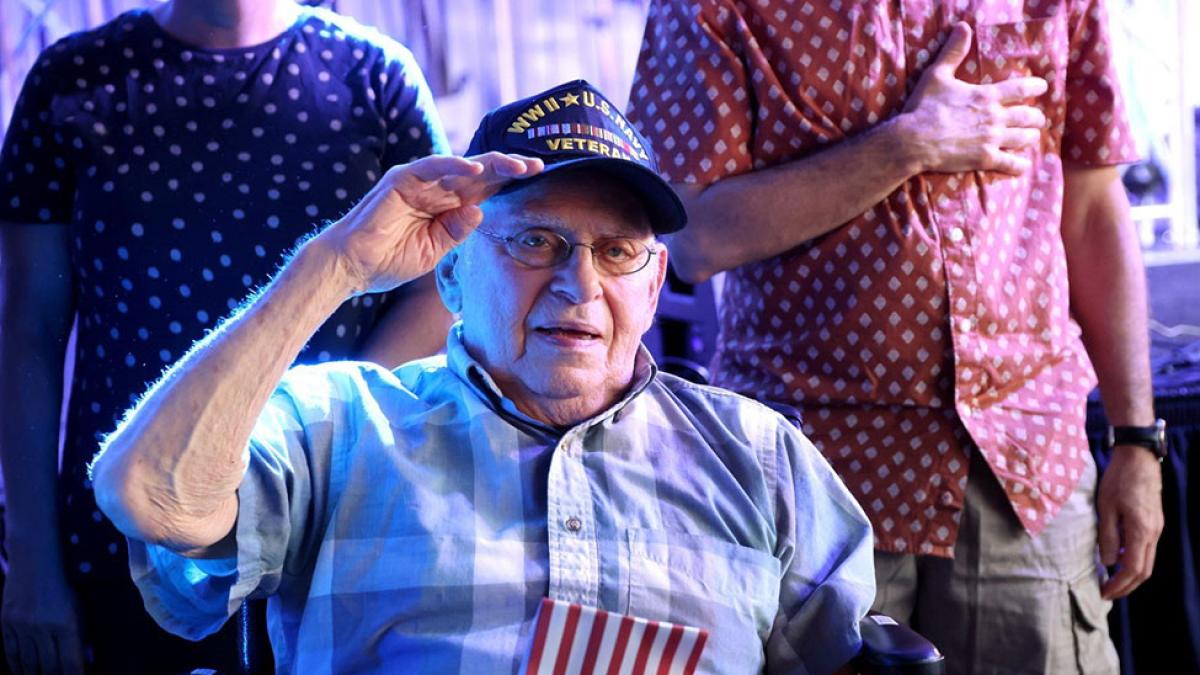
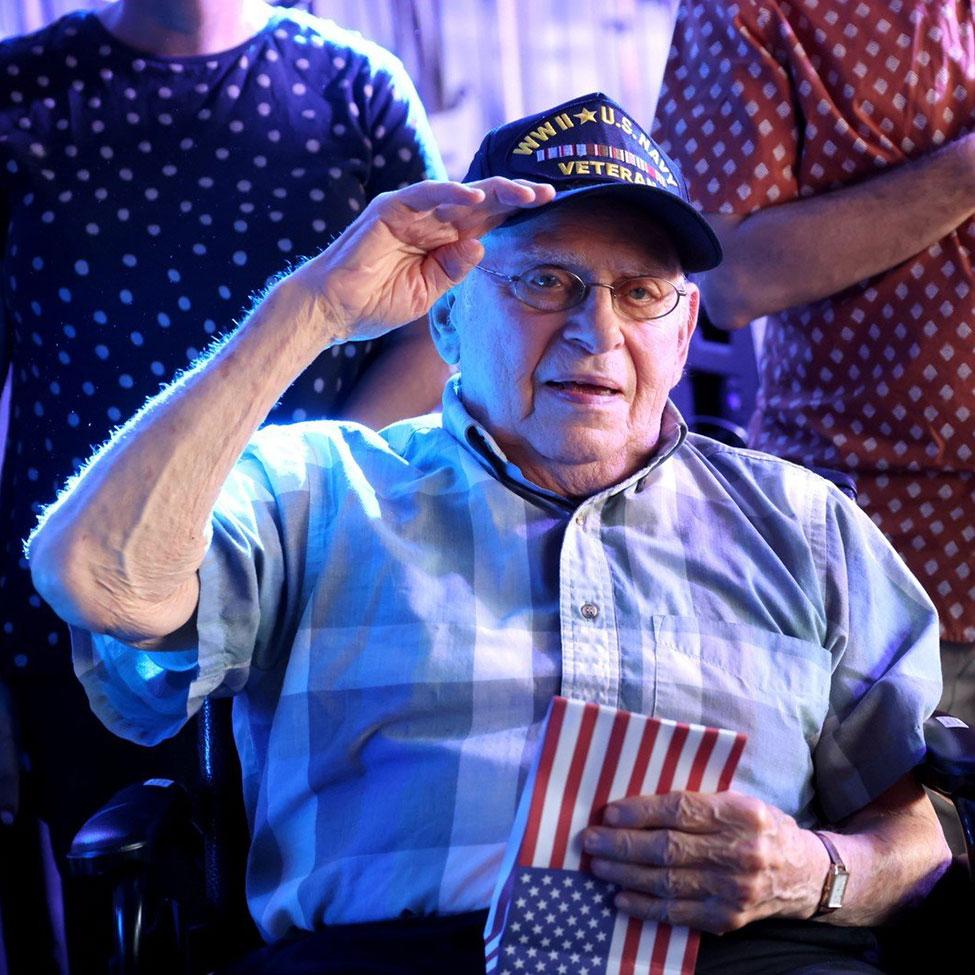
This year, Pace Reunion welcomed a very special guest: Arthur Grabiner ’50, who attended the annual Golden Graduates Luncheon to celebrate his 75th anniversary reunion.
The extraordinary milestone is one of several for Arthur in 2025. As a decorated veteran of the Pacific Theater of World War II, Arthur celebrated 79 years since his Honorable Discharge from the United States Navy in May. In the preceding month of April, he was awarded the US Congressional Gold Medal, the highest civilian honor bestowed by Congress, for his exemplary patriotism and contribution to American history. At an age of “99-years-young,” Arthur looks forward to his 100th birthday in December.
For Arthur, age is truly but a number. He continues to remain active and engaged, routinely making public appearances—including as an honored guest of this year’s Pace commencement ceremonies. Arthur also frequently makes time to speak at a variety of historical and educational events, demonstrating his tireless sense of duty to sharing experiences and insights from his service with younger people. In recognition of Arthur's valiant World War II US Navy service and dedication to educating and inspiring younger generations, he was inducted into the New York State Senate Veterans' Hall of Fame during a 2019 ceremony in the New York State Capitol in Albany.
Arthur’s story reminds us of the sacrifices made by so many to ensure a better future for us all, the capacity we each possess to inspire and stir the hearts of others, and the profound, lasting impact of a Pace education. Arthur graciously shared some reflections with us which we publish below, in his own words.
Q&A
As you celebrate your milestone 75th reunion, how do you reflect on your time at Pace University—then Pace College?
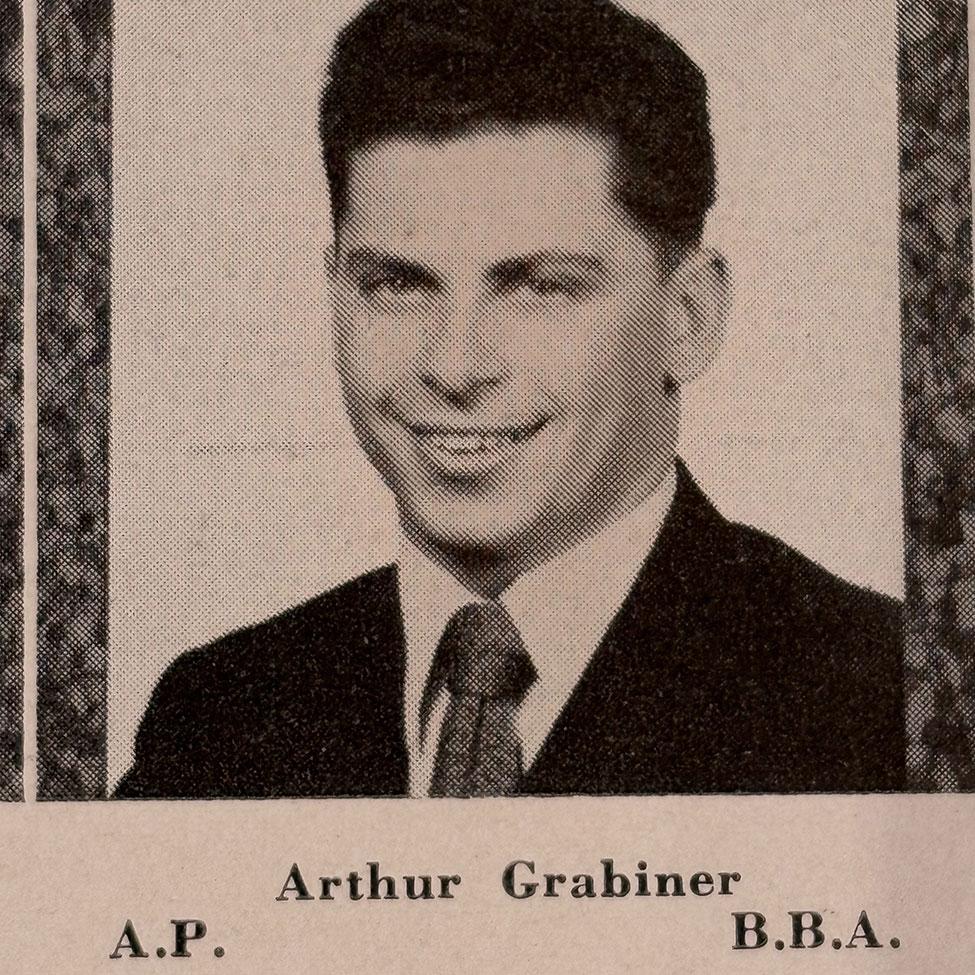
Following the Allied victory in World War II (WWII) and the Allied occupation of Japan, I received my Honorable Discharge from the US Navy in May of 1946... 79 years ago. Anxious to further my education, I enrolled in what was then known as Pace Institute, under the GI Bill, in February of 1947.
I attended classes inside the Transportation Building at 225 Broadway in Lower Manhattan. Interestingly, the Wikipedia entry for "Transportation Building (Manhattan)" includes the following: "One of the first tenants of the Transportation Building was the Pace Institute—the predecessor of the school that is now Pace University—which moved into the building in 1927 and remained until the 1950s."
All of my fellow classmates at Pace, like me, were returning WWII veterans. Some of our faculty, too, were WWII veterans. Given that 225 Broadway was an office building, Pace students were obligated to wear a dress shirt and tie to class. Upon exiting the subway in Lower Manhattan, after traveling from my family's home in the Bronx, I put on a bowtie before entering 225 Broadway. Following class and immediately after exiting the building, I removed my bowtie.
While I was studying at Pace, the institute was elevated to college status, and became known as Pace College. I attended classes year-round, earning a Bachelor of Business Administration in three years. As a graduating member of the Pace College Class of 1950, our commencement took place inside the Waldorf-Astoria Hotel. For my yearbook photo in "The Legend 1950," I upgraded from a bowtie to a necktie.
What inspires you to remain a dedicated and involved member of the Pace alumni community?
My education at Pace gave me the foundation to cultivate a productive business career, and to raise and provide for my family while playing my small role in helping propel the United States of America to then-unparalleled heights of prosperity. For half a century, I enjoyed a flourishing career and thriving practice as a Certified Public Accountant and principal of a midtown Manhattan public accounting firm. At Pace, I was the first member of my family to earn a college degree. 75 years later, this past May 2025, I enthusiastically attended Pace University's commencement while wearing a cap, gown, and military cord (US Navy) inside Louis Armstrong Stadium at the USTA Billie Jean King National Tennis Center.
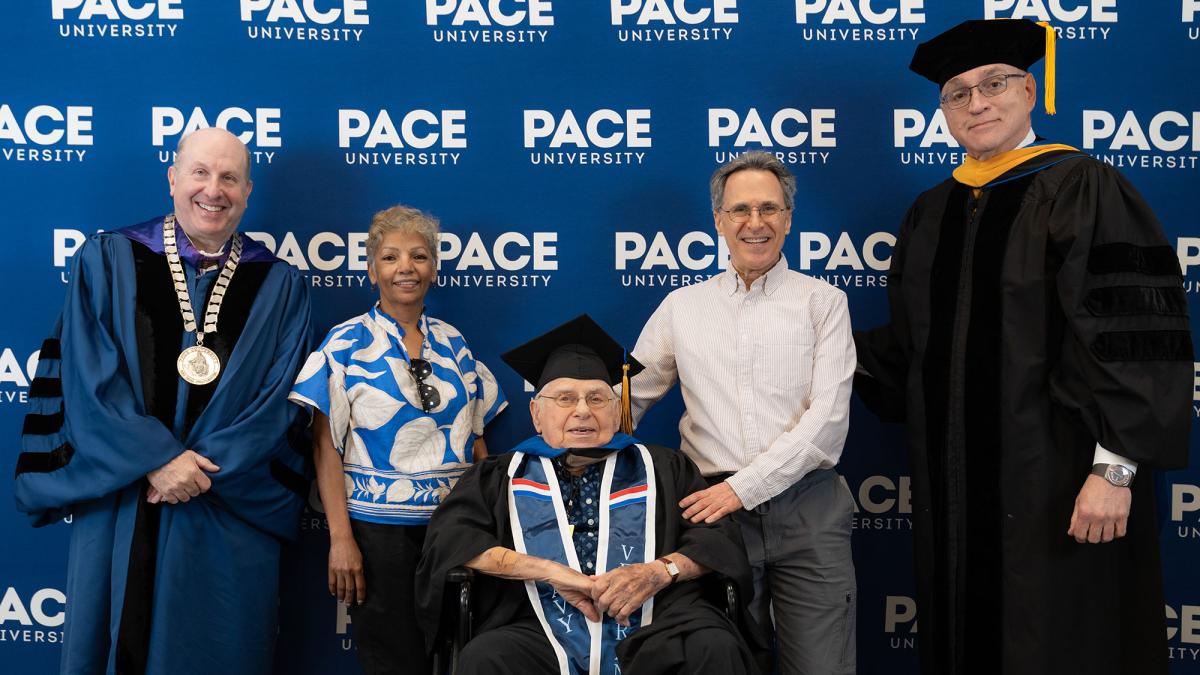
I'm grateful to Pace for graciously welcoming my participation, and to President Krislov for generously acknowledging my presence during his remarks from the stage. Concurrent with President Krislov's greeting, I was shown on the towering, overhead screens around the stadium. I was ecstatic! I cannot imagine a US Open Tennis Tournament Champion being as thrilled as me. Only minutes immediately preceding commencement, I, alongside my son, Douglas, and my eminently resourceful aide, Angela, were delighted to pose for photos with President Krislov and Dr. Jonathan Hill. Earlier this month, June 2025, I eagerly attended Pace's Golden Graduates Luncheon inside 15 Beekman Street, the newest building on Pace's Lower Manhattan campus.
I very much enjoyed meeting my fellow Pace Golden Graduates alumni, spending time with President Krislov, and learning more about Pace's storied history from esteemed University Archivist, Ellen Sowchek.
As a lifelong New Yorker, do you have a favorite place in NYC?

Growing up in the Bronx, my world was confined to predominantly 20 blocks north, 20 blocks south, 20 blocks east, 20 blocks west surrounding my family's home. While serving in the US Navy in WWII's Pacific Theater, I recall standing on the shore of New Guinea in the South Pacific, many thousands of miles from home, as an 18-years-young teenager. Gazing over the Pacific Ocean, the horizon seemed limitless.
Like many of my fellow service members who answered the call in defense of the United States of America, I eagerly traded the concrete sidewalks and comforts of home and family for the waves of the Pacific Ocean amid the uncertainty and perils of war. I grew up... fast. We all did.
I proudly served my country as a crew member aboard the USS Laurens APA153 in the Pacific as a teenager (18, 19, 20-years-young), launching amphibious assaults and combating Japanese kamikaze aircraft attacks during the Invasion of Lingayen Gulf in Northern Luzon in the Philippines and Battle of Okinawa. Evading Japanese enemy submarines while conducting island-hopping campaigns, the USS Laurens logged more than 60,000 nautical miles in WWII's Pacific Theater. We sailed from as far south as New Caledonia (east of Australia) north to New Guinea, the Mariana Islands, the Philippines, Okinawa, Pearl Harbor, then Japan (the latter for the Allied occupation following Japan's surrender), plus off of the Aleutian Islands near Alaska.
Unsurprisingly, my favorite New York City venue is the WWII US Navy aircraft carrier, USS Intrepid (CV-11), at the Intrepid Museum at Pier 86, West 46th Street on Manhattan's Hudson River waterfront. Following the noble example established by Pace, I remain persistent in my efforts to make positive and enduring contributions to society. In addition to my speaking engagements and school visits, I currently and actively volunteer at the Intrepid Museum.
While volunteering aboard the Intrepid, I share vivid anecdotes and answer questions regarding my WWII US Navy service. I also take photos with museum visitors while displaying components of my personal collection of vintage WWII artifacts—including photos, documents, etc.—spread across two tables and four easels aboard the hangar deck of the Intrepid. Almost 100-years-young, I am determined to remain active, vital and engaged while continuing to live my life purposefully. I will not allow age to define or limit me.
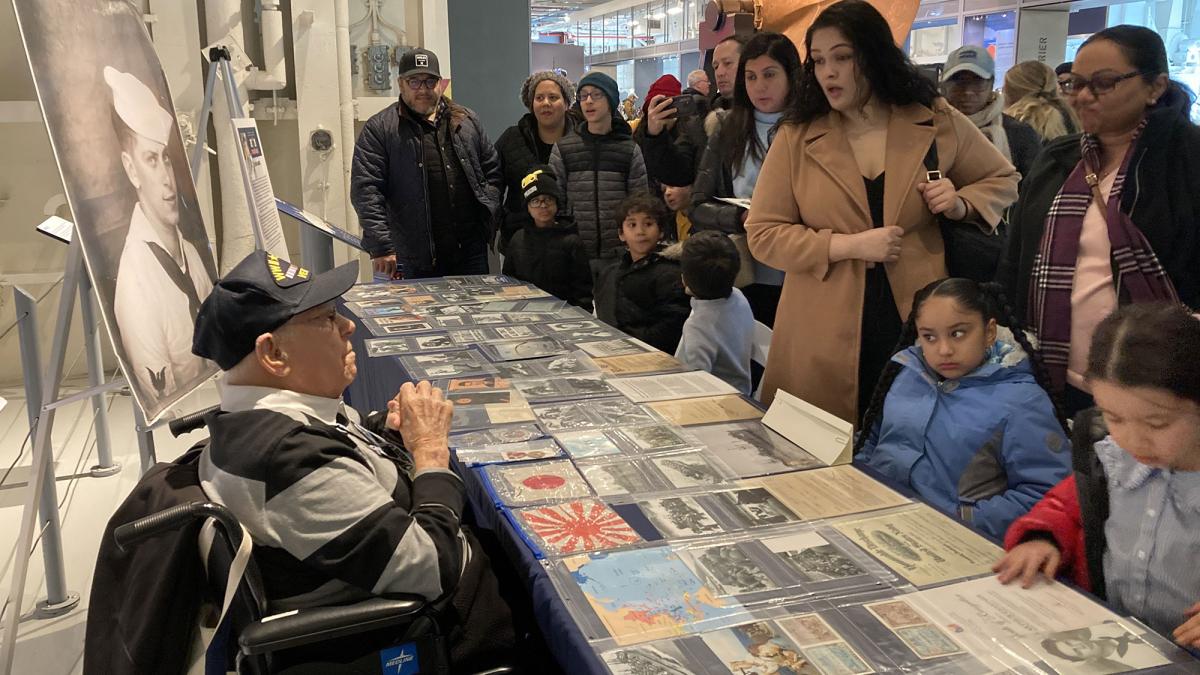
Being aboard the Intrepid invigorates me at almost 100. I feel like a gung-ho, invincible, teenage US Navy sailor back in the thick of things in WWII's Pacific Theater, eager to mix it up once again. Unlike the famed 16th century explorer, Ponce de Leon, I discover the Fountain of Youth while volunteering aboard the Intrepid.
Last month, May 2025, marked 79 years since your honorable discharge from the United States Navy, in which you served and defended our country in World War II—another remarkable milestone. What did your service in the Navy teach you about yourself and others?
My service as a teenager in the US Navy allowed me to appreciate that when we, as Americans, come together, we can accomplish anything. And we did. We won the war. My service to our nation also taught me that the most powerful weapon is a free people, unselfishly committed to a cause greater than themselves, willing to fight and die in defense of freedom. As we exclaim in the US Navy, "Non sibi sed patriae" ("Not for self, but for country"). I am proud to be an American. I am proud to have worn the cloth of this great nation while serving my country... and I am grateful to all those who have and continue to do the same. To my fellow veterans and those currently, selflessly, valiantly serving in the US Armed Forces today, as we also exclaim in the US Navy, "Bravo Zulu" ("Well Done"). "Semper Fortis" ("Always Courageous") to my fellow US Navy Veterans.
I am proud to be an American. I am proud to have worn the cloth of this great nation while serving my country... and I am grateful to all those who have and continue to do the same.
As former Secretary of the Navy Carlos Del Toro graciously remarked about me during his keynote address during the Chairmen's Dinner in NYC's Times Square District on the eve of the commissioning ceremony for the US Navy's USS Cooperstown (LCS-23), I remain as passionate about today's Navy as I was when I wore the uniform and served during WWII. For example, as I do annually, I again participated in the New York City Veterans Day Parade last November. Veterans Day 2024 was my equivalent of a high school athlete's “National Signing Day.” Producers of the parade at the United War Veterans Council, as well as WABC-TV, Channel 7, and the US Navy requested that I participate in a live interview alongside US Navy Rear Admiral Carl Lahti during WABC-TV's live broadcast of the parade.
During the live interview, I humorously made Rear Admiral Lahti "an offer he couldn't refuse.” I proposed to rejoin the US Navy, provided that I, the US Navy’s “newest/youngest-at-heart recruit,” be assigned a top rack (bunk) for my sleeping accommodations aboard a US Navy ship. Rear Admiral Lahti enthusiastically responded to WABC-TV's Lucy Yang, "We'll take him back. We'll take him back today."
To this day, you work dutifully as a living historian, speaking to others – especially students – about World War II, your service, and the experiences and lessons you took with you from that time. What drives you to continue sharing your story?
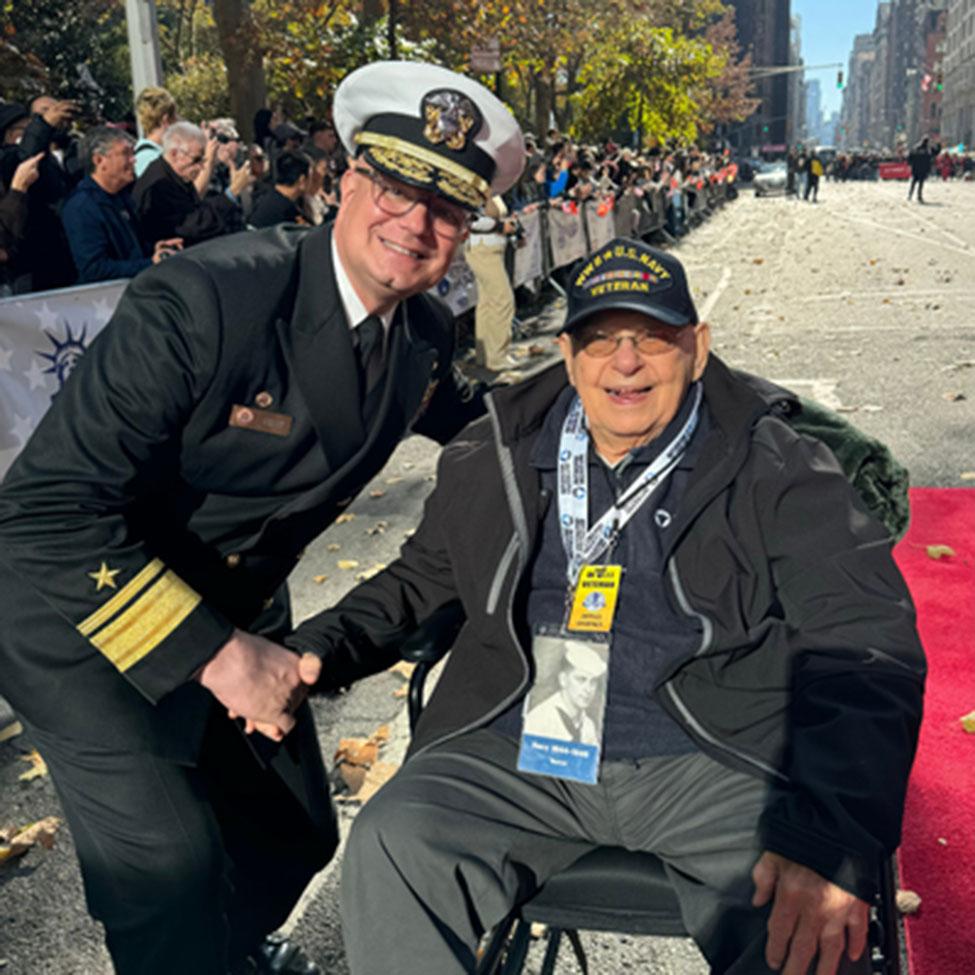
80 years following the Allied Victory in WWII in 1945, I continue to serve by visiting students enrolled in elementary, middle, high school, universities, federal service academies, senior military colleges, ROTC programs throughout the USA and abroad while enthusiastically sharing enduring lessons I learned about courage, perseverance, honor, freedom, patriotism.
With the hope that the horrific, genocidal perils of the WWII era may never resurface, I eagerly meet with, speak to, and invest time in younger generations. To honor my fellow service members who, like me, wore the uniform of the US Armed Forces during WWII and to help preserve their legacy, particularly those who were killed or wounded, I continue to dedicate myself to educating students about their courageous service and selfless sacrifices.
I describe the cost of defending the United States of America to students as follows. The largest funeral I have ever and will ever attend occurred on April 2, 1945, during the brutal Battle of Okinawa. Wearing my dress white US Navy uniform, I stood at attention and saluted while on the top deck of my ship, USS Laurens APA153. As the bugler blew taps, my fellow US Navy sailors, killed in action during Japanese kamikaze suicide aircraft attacks on our task unit of US Navy ships earlier the same day, were buried at sea. The remains of each sailor who made the ultimate sacrifice, inside a weighted canvas bag covered with the American flag, was slid into the watery grave of the Pacific Ocean.
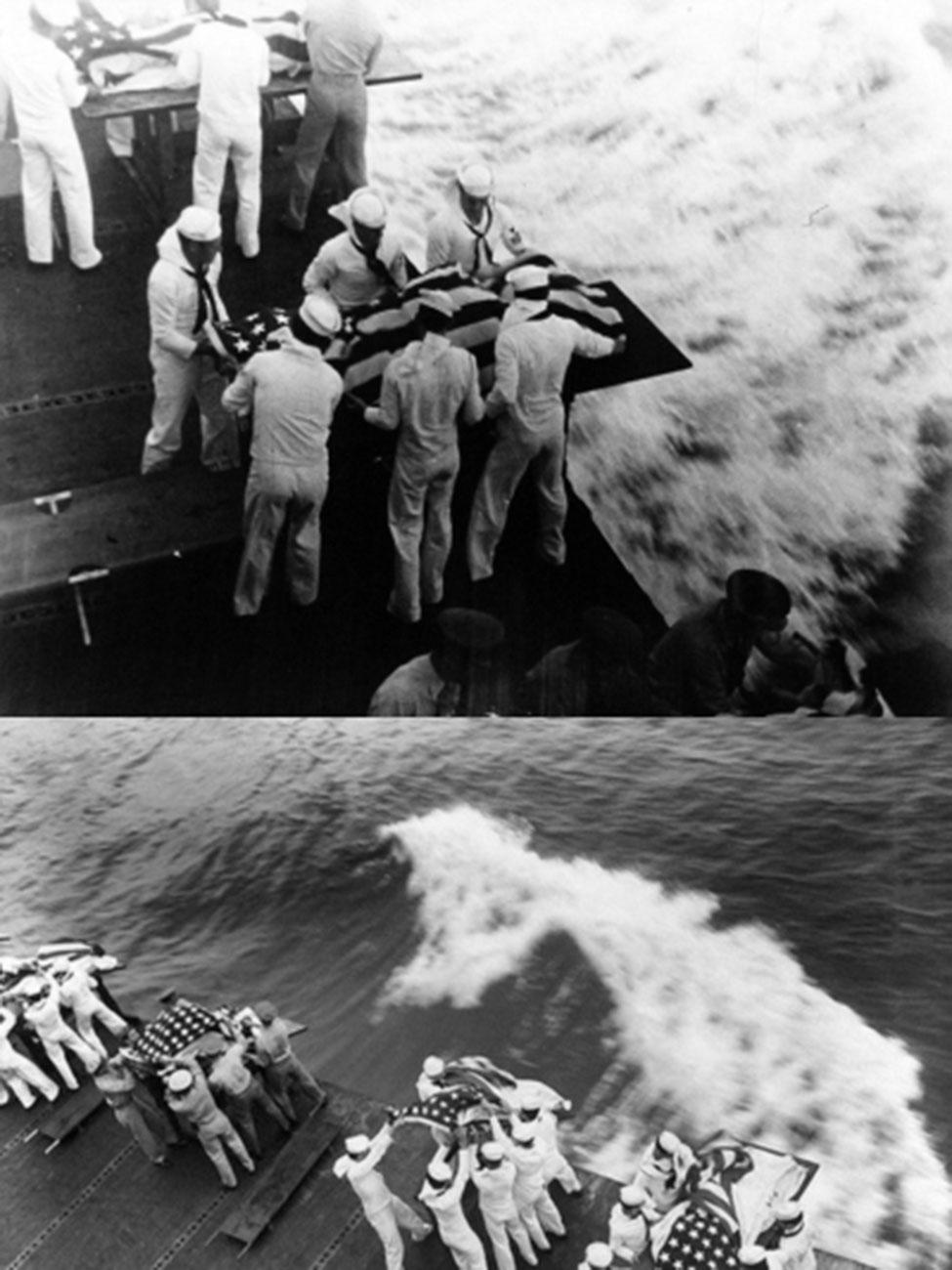
As I reflected upon my fellow sailors' fate, I thought of their families back home in the States, their mothers, fathers, brothers, sisters. None would have a grave with a stone to visit and grieve over. Maybe they would be given their son's, brother's, husband's dog tags if they were not lost amid the wreckage or destroyed in the fire of the kamikaze attacks.
I strive to impress upon young generations that those with whom I served, those who rendered the last, full measure of devotion to our nation, sacrificed two lives: The life they were living before being killed in action, and the life they sacrificed in a commitment to a cause greater than themselves—returning home to a loving family and grateful nation, gaining an education, cultivating a profession, experiencing the blessings of being a husband, father, grandfather, great-grandfather, elderly man.
I have experienced and enjoyed these blessings. Therefore, it is my duty to honor them while preserving their legacy of service, sacrifice, and valor.
As an Authentic Living Historian, how do you hope to influence the study and awareness of World War II?
As an Authentic Living Historian, I am adamantly opposed to having young generations rely exclusively on impersonal textbooks, videos, films, and Zoom sessions to learn history. Consequently, I remain dedicated to enabling young students the unique opportunity to meet, converse face-to-face with, and ask questions directly of a WWII US Navy Veteran. According to research performed by the US Dept. of Veterans Affairs, of the 16.4 million Americans who served in the US Armed Forces during WWII, only approximately 61,000 (little more than 1/3 of 1%) of these American Heroes, National Treasures, sources of immense national pride, are estimated to remain with us. Considering only WWII US Navy veterans such as myself, the number still living is the equivalent of a mathematical rounding error. The physical link to the generation that saved people, nations, perhaps the world, is rapidly diminishing. Sadly, it won't be long before all we have left are museums, history books, photographs, television interviews, oral histories and films.
Now, 80 years following the Allied Victory in WWII in 1945, the opportunity to meet a service member in the greatest conflict in recorded human history is fast fleeting. For many Americans, the next time they meet a WWII veteran may be the last time they meet a WWII veteran.
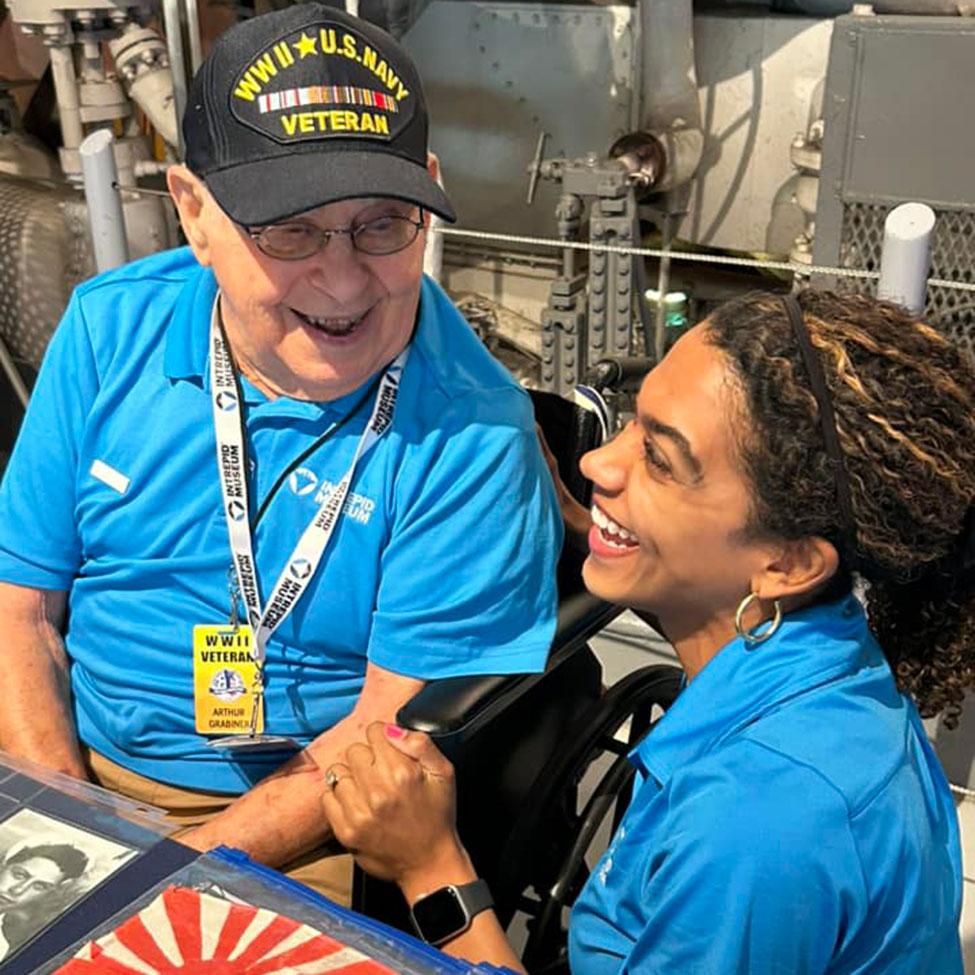
My purpose in volunteering aboard the Intrepid Museum at almost 100-years-young aligns with the museum's mission to "promote the awareness and understanding of history...and service...in order to honor our heroes, educate the public and inspire future generations.” Imagine the delight of a young student, excitedly visiting a WWII US Navy aircraft carrier and, unexpectedly, being greeted by one of the last remaining WWII US Navy Veterans. Now, imagine, this amazed young student listening intently as I provide my firsthand, vivid description of my shipmates and I aboard the USS Laurens (APA153), launching an amphibious invasion of an island occupied and defended by the Japanese military, our evading Japanese enemy submarines, our encounters combating Japanese kamikaze suicide aircraft attacks, and our resultant participation in the US Navy burial at sea. That young student may be inspired to pursue further study of WWII and, subsequently, enlist in the US Navy.
By educating young generations, I strive to remedy the historical illiteracy concerning WWII in the Pacific Theater.
Too often, my fellow WWII Veterans of the Pacific Theater and I are disheartened when students confess that they were unaware WWII was also waged in the Pacific. Too many mistakenly believe that WWII was exclusive to the European Theater. Furthermore, I emphatically articulate that I will not refer to 1945, nor May 8, 1945, neither September 2, 1945, as the "end" of WWII, nor the "end" of WWII in Europe, nor the "end" of WWII in the Pacific, respectively. Instead, I declare that I will characterize the forementioned three milestones as the "Allied Victory". I reason that the Allies and the Axis Powers did not "play to a tie.” President Franklin Delano Roosevelt, my first Commander-in-Chief, punctuated his "Day of Infamy" address 24 hours following the Japanese attack on Pearl Harbor as follows: "No matter how long it may take us to overcome this premeditated invasion, the American people in their righteous might will win through to absolute victory."
Furthermore, I remind listeners that Prime Minister of the United Kingdom during WWII, Winston Churchill, did not contort his fingers to resemble the letter "E". Instead, Churchill raised and parted his index and middle fingers to illustrate the letter "V" for "Victory."
By educating young generations, I strive to remedy the historical illiteracy concerning WWII in the Pacific Theater.
When you look back on your extraordinary life, what are you proudest of? What have been the keys to your successes, and how have you navigated failure?
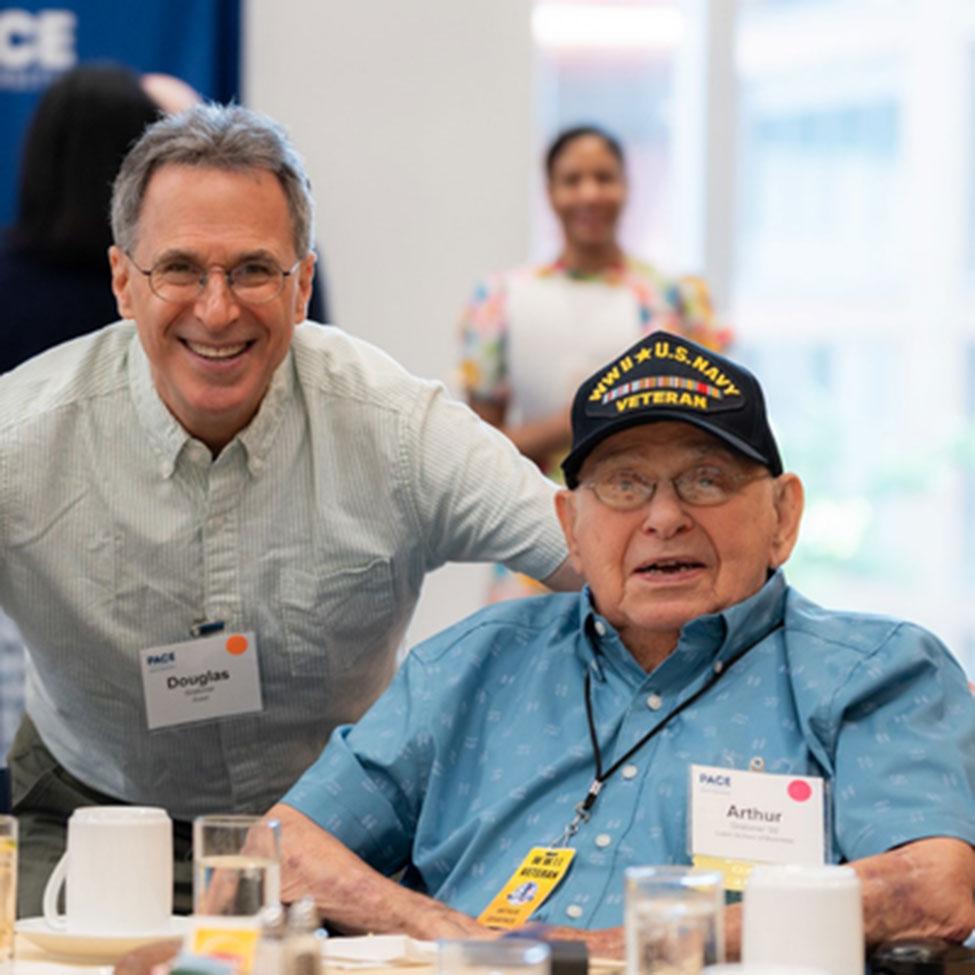
In the twilight of my life, the proudest and most enduring components of my legacy are, of course, my children, grandchildren, great-grandchildren. I hope that I have been a positive influence on them.
I'm heartened when my youngest son, Douglas, proudly proclaims, "Most children never meet their hero. I'm extraordinarily blessed to have been raised, inspired, and unconditionally loved by my hero, my Dad, Arthur. Every day is Father's Day. Every day is Veterans Day." I'm blessed. My cup runneth over.
My commitment to causes greater than myself, including my enthusiasm for educating and inspiring young generations as a current volunteer aboard the Intrepid Museum, as well as during school visits locally, domestically, and abroad – such as I did in Manila, Philippines this past February 2025 – I hope instructs people everywhere of all generations that old age is not an obstacle to remaining relevant, but rather an opportunity to share a modern ager's experience and wisdom. By exuberantly sharing the enduring lessons I learned about courage, perseverance, honor, freedom, and patriotism, I hope to demonstrate that modern agers are not dispensable, but, instead, essential.
To motivate myself, I reason that Abraham (of the Old Testament) lived to 175 years of age. At 99-years-young, months shy of my 100th birthday, I am therefore middle-aged, I tell myself. My mantra has become "roll with the rhythm of the world.” In other words, getting aggravated only gets you aggravated. So, why bother?
What is one piece of advice you would give to recent Pace graduates?
Congratulations on your milestone achievement and welcome to the close-knit family of proud Pace alumni. As we exclaim in the US Navy, "Anchors Aweigh.”
Regarding advice, I will invoke the words and wisdom of Mark Twain: "Go out on a limb, that's where the fruit is."
By exuberantly sharing the enduring lessons I learned about courage, perseverance, honor, freedom, and patriotism, I hope to demonstrate that modern agers are not dispensable, but, instead, essential.
Pride and Purpose: Sav Ackerman ’25
Sav Ackerman ’25 has always had a strong work ethic. Born into an abusive and impoverished upbringing, both of Sav’s parents passed away by the time Sav was 15 years old. “There were many hard days growing up,” shared Sav. “Prior to passing away, my mother was a single parent and worked full-time while going to school for nursing. I started working to support myself from the time I was 15 and continued to work throughout law school.”
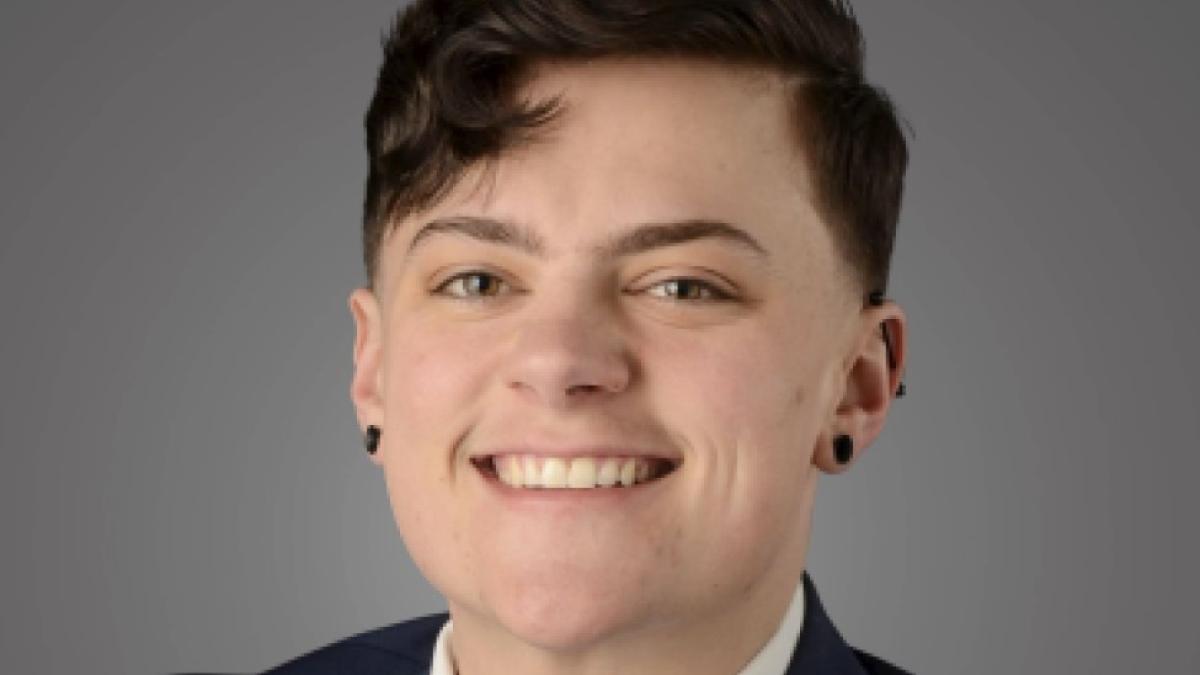
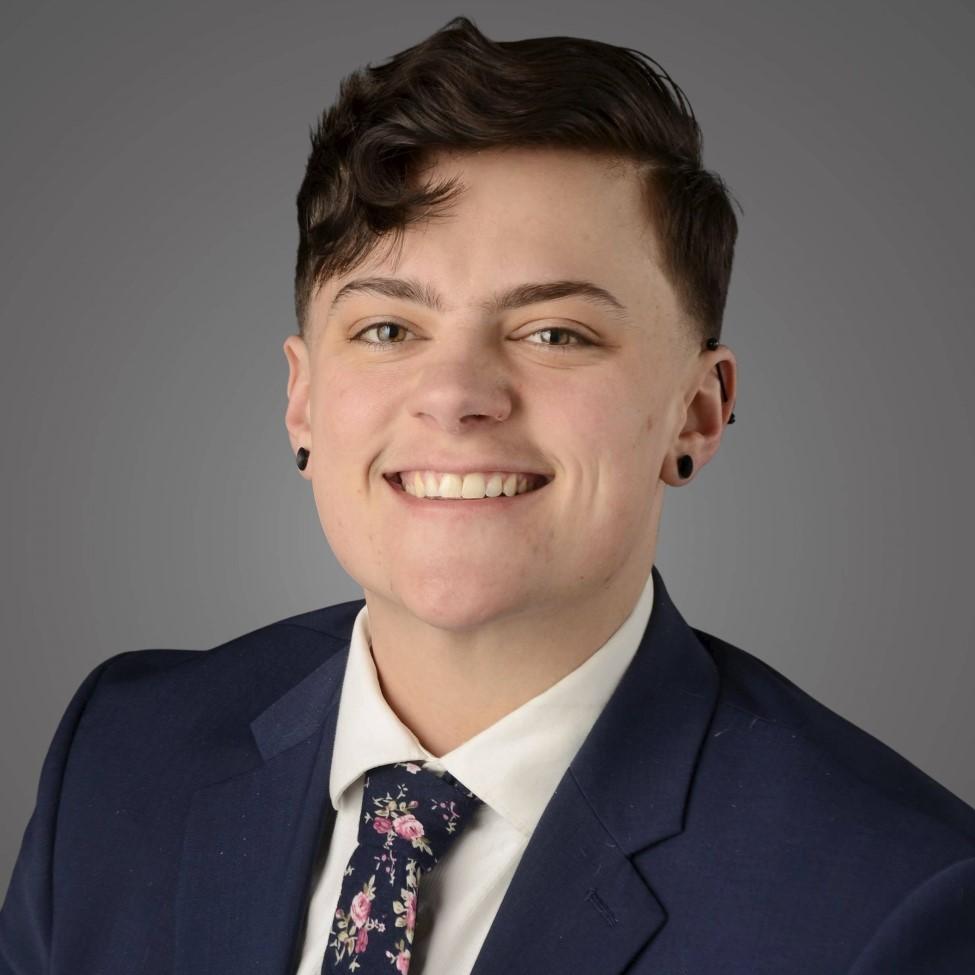
Sav Ackerman ’25 has always had a strong work ethic. Born into an abusive and impoverished upbringing, both of Sav’s parents passed away by the time Sav was 15 years old. “There were many hard days growing up,” shared Sav. “Prior to passing away, my mother was a single parent and worked full-time while going to school for nursing. I started working to support myself from the time I was 15 and continued to work throughout law school.”
It was the Elisabeth Haub School of Law at Pace University's FLEX JD Scheduling Option that attracted Sav the most. “The FLEX JD program fit my schedule perfectly,” said Sav. “It allowed me to continue working without overwhelming my already busy schedule while also providing me with the ideal amount of academic intensity I needed.” Once they started at Pace Haub Law, Sav found the Law School atmosphere extremely communal in nature. “Everyone wants one another to succeed. The connections I made – professors, fellow students, administrators – all allowed me to deepen my understanding of the law and how to be a successful advocate.”
Sav recalls Adjunct Professor Stefen Short as one of the most remarkable individuals they met while studying at the Law School. “Professor Short introduced the topic of incarcerated peoples' rights to me as a student after my summer of working at The Legal Aid Society of Westchester, and illuminated a field of lawyering I didn't know was reachable,” shared Sav. “He inspired me with a different way of thinking when approaching advocacy that I will never forget.”
While Sav was at Pace Haub Law, they were the FLEX Representative for Lambda Law Students. They launched the innovative and impactful Name Change Clinic at Cubbyhole Bar in New York City. “This initiative was very important to me,” shared Sav. “I, along with other Pace Haub Law Lambda Law Students, handed out paperwork and information to allow individuals to change their legal name in New York State. Being able to see this initiative become a reality and take it into New York City at a landmark LGBTQ+ space, like Cubbyhole, was amazing.” While Sav was a law student, they also co-founded the LAMBDA LGBTQIA+ Judge Mentorship Program, where LGBTQIA+ judges across the state of New York assist in mentoring law students at the Law School.
Today, Sav is studying for the bar exam and working as a law graduate with The Legal Aid Society of New York City. “I hope to continue to learn and expand my advocacy for minority communities and indigent clients so that their voices may be heard,” said Sav.
In their spare time, Sav pursues music as an outlet. “I am a musician and continue to play guitar, drums, and piano. I love creating lyrics and music that allows me to feel!” As far as words of advice, Sav encourages current and future law students to remember why you started your law school journey, but to also open your arms to changing and learning within the field. “Don't be afraid to evolve and never give up.”
Westchester Columbian Lawyers Association Honors Dean for Students Angie D’Agostino with Honorable Richard J. Daronco Distinguished Service Award
Angie D’Agostino, Dean for Student and Campus Affairs at the Elisabeth Haub School of Law at Pace University, was honored with the Honorable Richard J. Daronco Distinguished Service Award by the Columbian Lawyers Association of Westchester County at the organization’s annual dinner on June 13, 2025. The prestigious award recognizes individuals of Italian heritage who have made significant contributions to the bench or bar and who exemplify service, leadership, and a deep commitment to community.
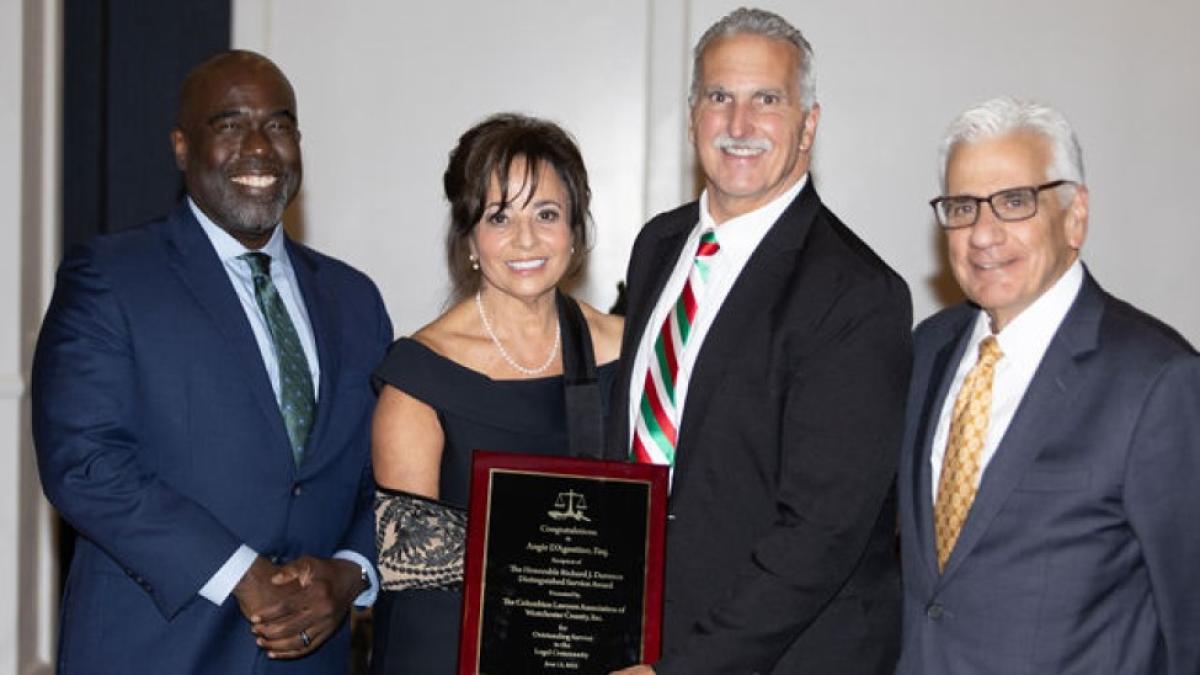
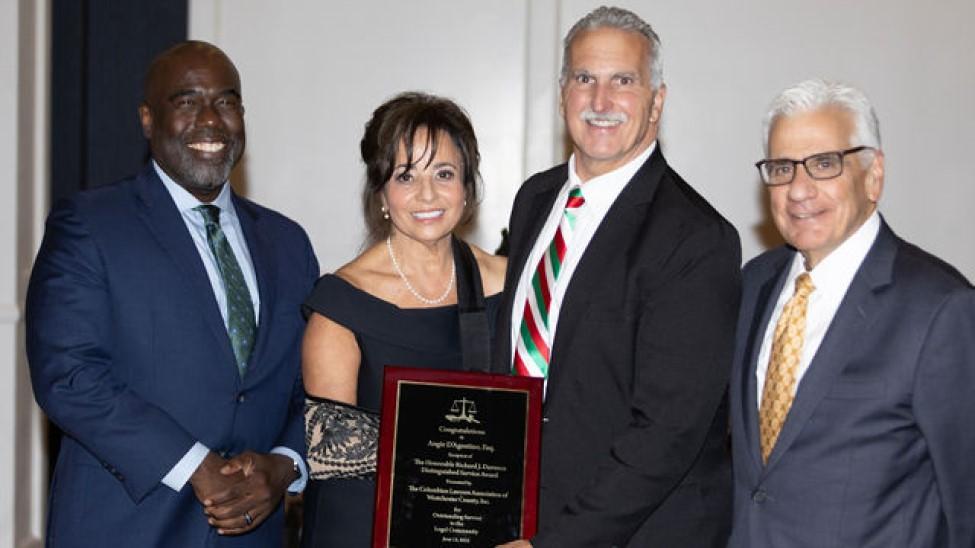
Angie D’Agostino, Dean for Student and Campus Affairs at the Elisabeth Haub School of Law at Pace University, was honored with the Honorable Richard J. Daronco Distinguished Service Award by the Columbian Lawyers Association of Westchester County at the organization’s annual dinner on June 13, 2025. The prestigious award recognizes individuals of Italian heritage who have made significant contributions to the bench or bar and who exemplify service, leadership, and a deep commitment to community.
The Honorable Richard J. Daronco Distinguished Service Award is named in memory of the former Justice of the Supreme Court of Westchester County and later the United States District Court for the Southern District of New York, and celebrates his legacy of integrity, compassion, and dedication to justice. Past recipients include the Honorable Janet DiFiore, Chief Judge of the State of New York and the Court of Appeals; Carl A. Vergari, former Westchester County District Attorney; the Honorable Mario Cuomo, former Governor of New York; and the Honorable Francis A. Nicolai, former Chief Administrative Judge for the Ninth Judicial District, among other distinguished Italian-American jurists and attorneys.
Dean D’Agostino’s career at the Elisabeth Haub School of Law at Pace University spans nearly 40 years. She began as an assistant in the Office of Admissions and rose steadily through the ranks, ultimately serving as Dean of Admissions and Student Affairs. During that time, she admitted and guided hundreds of law students, shaping their academic journeys through scholarships, mentorship, and unwavering support. In 1999, while working full-time, she earned her law degree from what was then Pace Law School, and in 2000 was appointed Dean for Students—a role she has held ever since with steadfast dedication, compassion, and purpose.
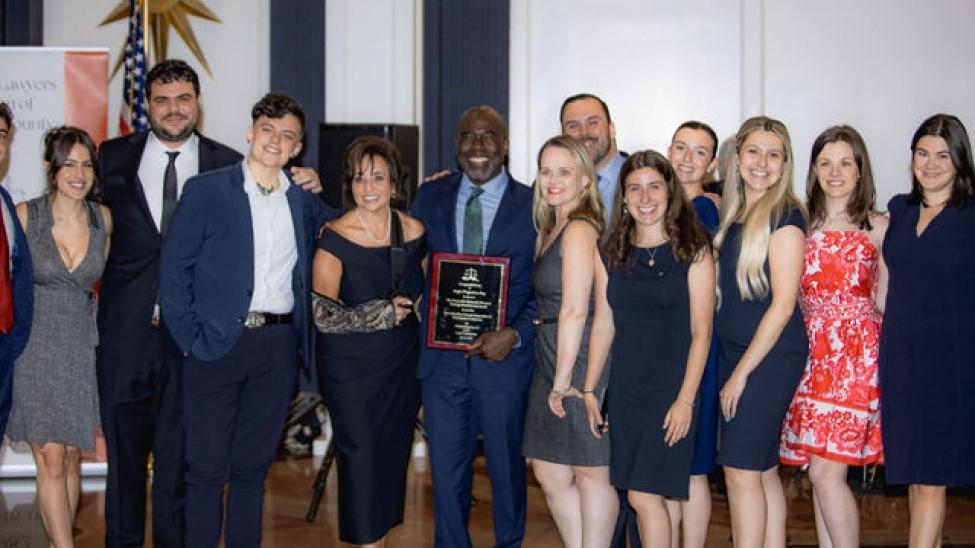
Affectionately known as “Dean D” by generations of students and alumni—many of whom now call her a friend and colleague—she has cultivated a culture of community at Pace Haub Law. Under her leadership, the Law School has expanded its mental health and wellness programs, providing critical resources to students during some of the most challenging times in their academic and personal lives.
The award was presented by Hon. Daniel Angiolillo, who praised Dean D’Agostino’s deep commitment to “Family, Faith, and Pace.” In his remarks, Horace E. Anderson Jr., Dean of the Elisabeth Haub School of Law, reflected on the many lives she has touched over her decades of service.
“Dean D’s impact extends far beyond the walls of the law school. For nearly 40 years, she has been a guiding force in the lives of thousands of law students—many of whom are now legal professionals in our community,” said Dean Anderson. “Her care, encouragement, and willingness to step in during some of the most difficult moments in a student’s life have made all the difference. There are countless attorneys today who would not be where they are without her.”
I’ve been blessed to serve at an institution where Opportunitas—the opportunity for first-generation students to rise—has mirrored both my personal journey and my cultural heritage.
—Dean Angie D'Agostino
During her heartfelt remarks, Dean D’Agostino spoke about her journey from humble beginnings, the transformative power of education, and the responsibility that legal educators carry as gatekeepers of the profession—one she has approached with deep seriousness and care.
“I’ve been blessed to serve at an institution where Opportunitas—the opportunity for first-generation students to rise—has mirrored both my personal journey and my cultural heritage,” she shared.
Dean D’Agostino has been a long-standing, involved member of the Columbian Lawyers Association, which has been a generous partner to the Law School, supporting many deserving law students through its scholarship program.
Press Release: Pace University Announces New Members to its Board of Trustees
Pace University’s Board of Trustees announced the election of two new members, Barbara A. Abeles, owner, chairman and chief executive officer of CBL Ceramics Ltd, and Sabrina A. Griffin ’92, inaugural chair of the Pace Alumni Association Leadership Council, to its Board of Trustees.
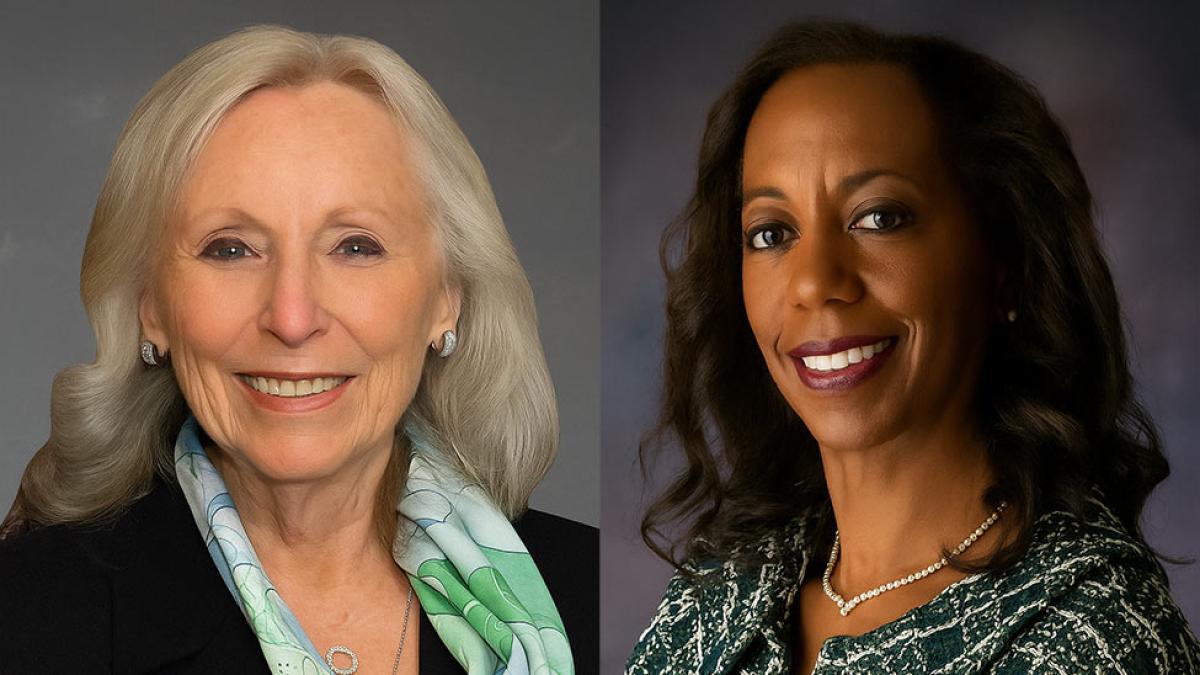
Barbara A. Abeles and Sabrina A. Griffin ’92 bring a shared dedication to leadership, philanthropy, and student success
Pace University’s Board of Trustees announced the election of two new members, Barbara A. Abeles, owner, chairman and chief executive officer of CBL Ceramics Ltd, and Sabrina A. Griffin ’92, inaugural chair of the Pace Alumni Association Leadership Council, to its Board of Trustees.
“Sabrina and Barbara exemplify Pace’s mission of expanding opportunity—Sabrina through her continued alumni leadership and Barbara through her longstanding philanthropic commitment to education,” said Rob Sands, chairman of Pace University’s Board of Trustees. “We are proud to welcome them to the board and look forward to the insight, perspective and leadership they bring to our community.”
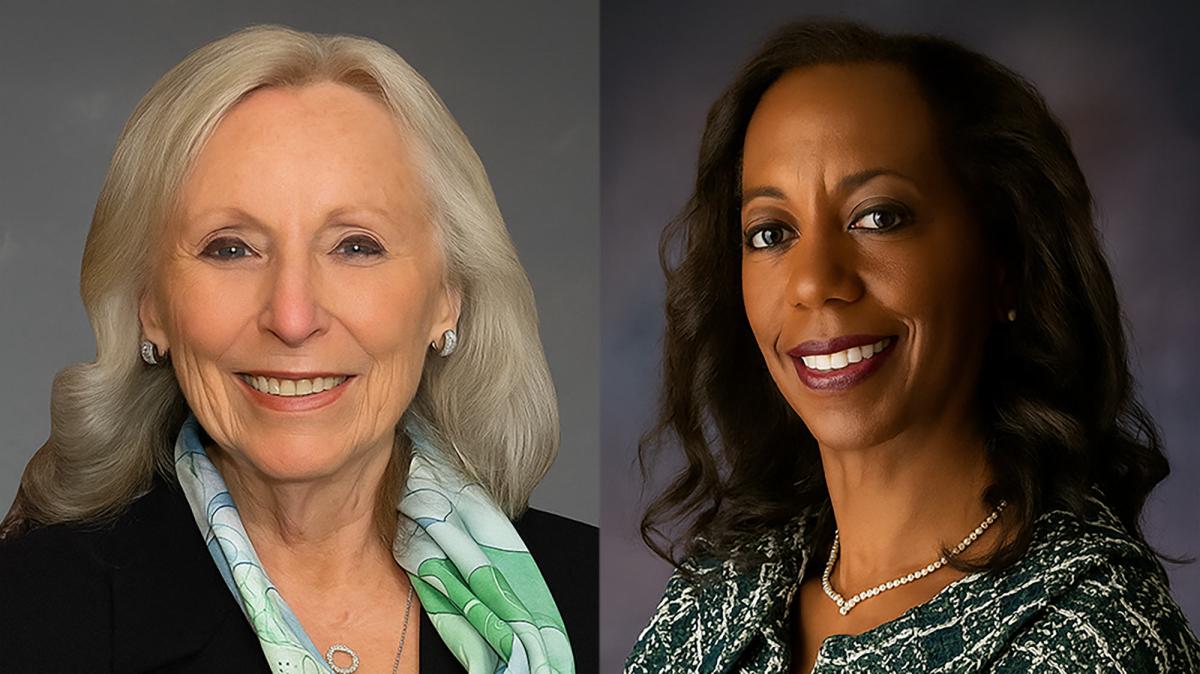
Abeles is chairman and CEO of CBL Ceramics Ltd., a Wales-based manufacturer of advanced ceramics for the global electronics industry. She has led the company for nearly three decades, overseeing global operations across finance, regulatory compliance, sales, and human resources. Under her leadership, CBL has become one of only three firms internationally producing a highly specialized class of industrial ceramics.
A longtime resident of Westchester County, Abeles has demonstrated a deep commitment to education and philanthropy. She serves on the Foundation Board of Westchester Community College and Pace University’s President’s Council. She is a major supporter of Pace’s Community Impact Internship Program and established a permanently endowed scholarship to address gender disparities in the sciences. Abeles holds a bachelor’s degree from Smith College and a master’s from Boston University.
“I’ve long admired Pace University’s commitment to creating opportunity through education,” said Abeles. “It’s an honor to join the Board of Trustees and to support a community so dedicated to empowering students to reach their full potential.”
Griffin served for more than 30 years at the Chubb Group of Insurance Companies, most recently as assistant vice president and diversity manager. During her tenure, she successfully managed and implemented leadership development programs geared towards women, people of color and LGBTQIA+ employees.
She currently serves on Pace University’s President’s Council, as inaugural chair of the Pace University Alumni Association Leadership Council and as a member of the Development, Alumni Relations and Public Affairs Committee. Griffin also serves on The Mahaffey Leading Ladies committee for The Bill Edwards Foundation for the Arts, in St. Petersburg, FL. helping bring live theater, books, art and music to more than 30,000 students annually. In addition, she serves on the arts and finance committees of the St. Petersburg Chapter of The Links, Incorporated, a national women’s organization committed to education, health and civic engagement. She holds an MBA in finance from Pace’s Lubin School of Business and a bachelor’s degree from NYU’s Stern School of Business.
“Joining the Board is an opportunity to give back in a way that’s intentional and inclusive,” said Griffin. “I want to help create pathways that meet people where they are—whether they’re students figuring it out or alumni reconnecting after time away. If we design experiences that reflect our community’s needs, we’ll keep building something truly meaningful together.”
About Pace University
Since 1906, Pace University has been transforming the lives of its diverse students—academically, professionally, and socioeconomically. With campuses in New York City and Westchester County, Pace offers bachelor, master, and doctoral degree programs to 13,600 students in its College of Health Professions, Dyson College of Arts and Sciences, Elisabeth Haub School of Law, Lubin School of Business, Sands College of Performing Arts, School of Education, and Seidenberg School of Computer Science and Information Systems.
Dean Horace Anderson Honored by Westchester County Board of Legislators
The Westchester County Board of Legislators honored Horace E. Anderson Jr., Dean of the Elisabeth Haub School of Law at Pace University, during its annual celebration of Caribbean American Heritage Month on June 16, 2025.
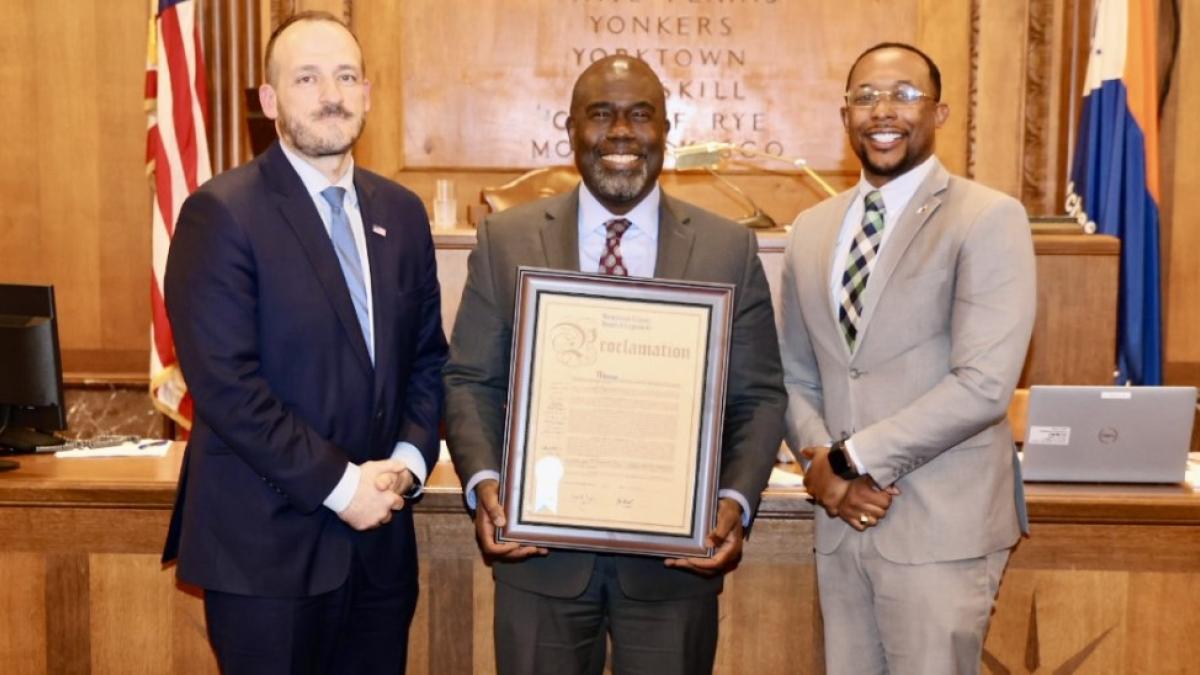
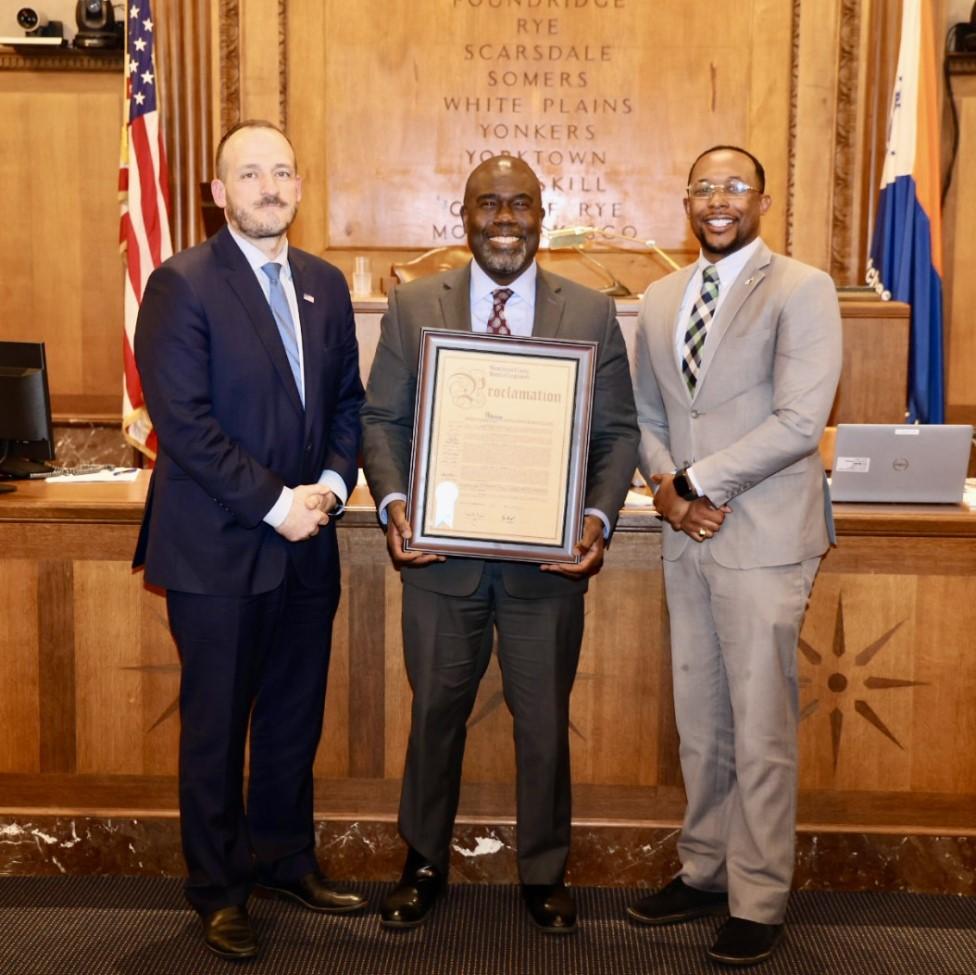
The Westchester County Board of Legislators honored Horace E. Anderson Jr., Dean of the Elisabeth Haub School of Law at Pace University, during its annual celebration of Caribbean American Heritage Month on June 16, 2025. Held at the Westchester County Center—with Dean Anderson’s name prominently displayed in lights for the evening—the ceremony recognized the extraordinary achievements and contributions of individuals who have made a significant impact on education, civic life, and public service in Westchester County, while celebrating the rich cultural legacy and community influence of Caribbean Americans.
Dean Anderson was celebrated for his unwavering commitment to advancing equity in the legal profession and expanding educational access, demonstrated through the Law School’s many partnerships aimed at diversifying the legal pipeline. Dean Anderson’s leadership has elevated the Law School’s national profile and strengthened its core mission of justice, academic excellence, and community engagement.
Board Chairman Vedat Gashi reflected on Dean Anderson’s journey as a first-generation American and pioneering educator, calling him an “exemplary Caribbean American whose contributions embody the values we celebrate.”
“As the first Black dean in the history of the Elisabeth Haub School of Law at Pace University, Dean Anderson has demonstrated exemplary leadership, elevating the Law School’s national standing and expanding its impact within our community. His commitment to fostering academic excellence, advancing diversity within the legal profession, and championing innovative programs in environmental law, social justice, and civic engagement has set a remarkable standard,” added Majority Leader Tyrae Woodson-Samuels. “We celebrate Dean Anderson as a distinguished leader and an outstanding representative of the Caribbean American community, whose contributions continue to enrich our institutions and inspire future generations.”
Also honored during the evening was Annmarie Smith, a longtime advocate for public education in Yonkers and a respected PTSA leader. Over decades of service, Ms. Smith has been a consistent voice for equitable school funding and quality education for all students.
Leveling Up: Pace Students Join International Game Jam
Students from Pace University’s Seidenberg School concluded the Spring 2025 semester with an international trip—by teaming up with peers from across Europe to take on disinformation through game design.
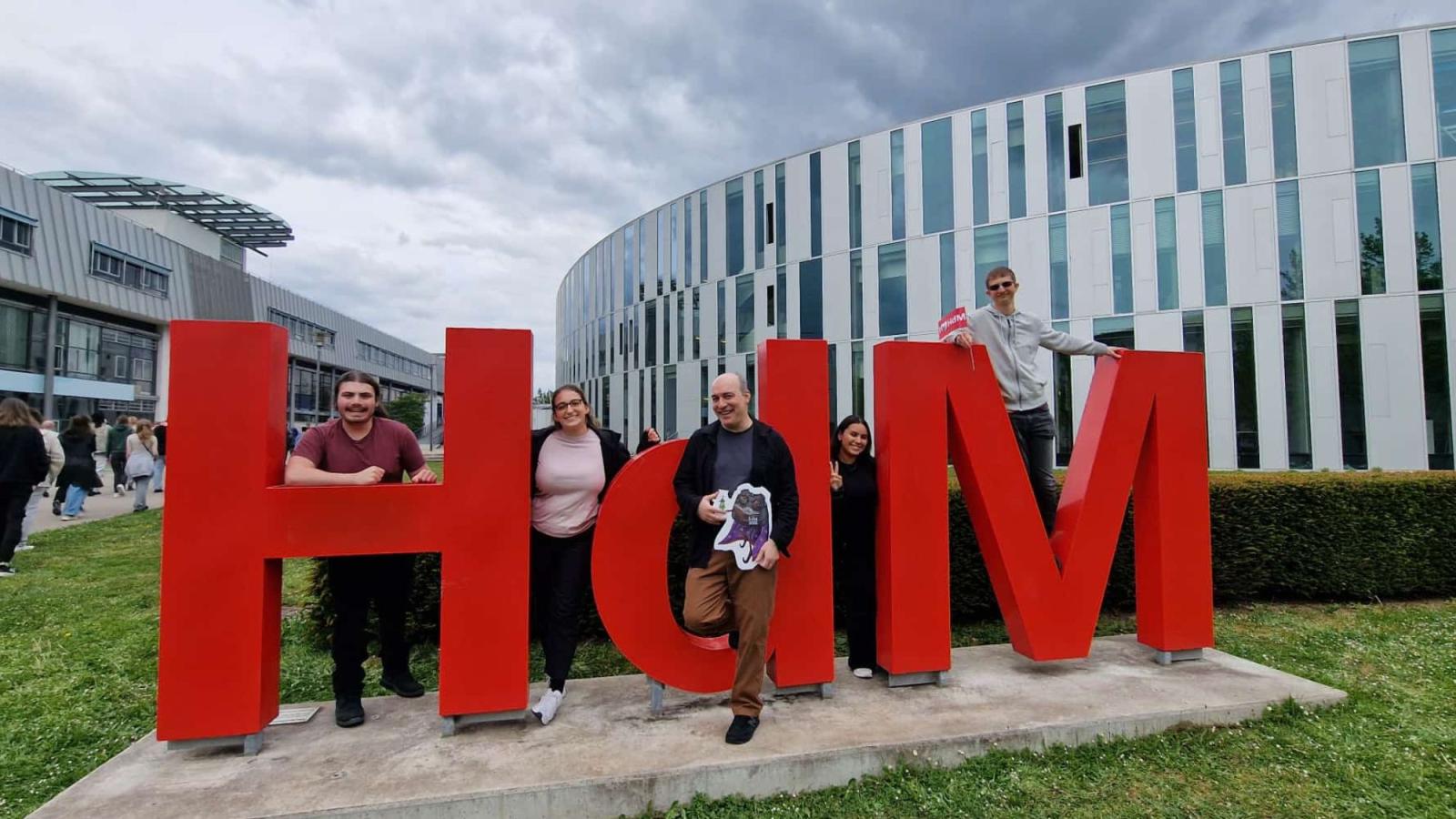
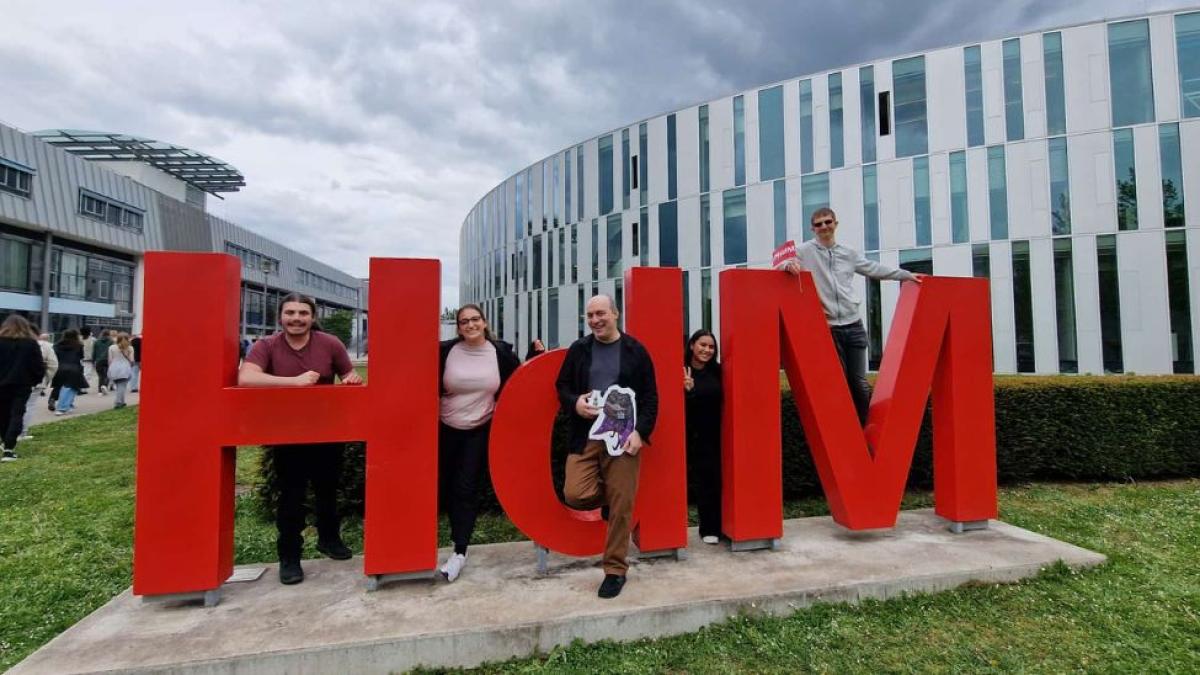
Students from Pace University’s Seidenberg School of Computer Science and Information Systems concluded the Spring 2025 semester with an international trip—by teaming up with peers from across Europe to take on disinformation through game design.
In May 2025, a group of Pace students from Seidenberg’s Game Development program traveled to Stuttgart, Germany, to participate in a unique international collaboration: the FMX PartnerDay Game Jam. Organized as part of the annual FMX (Film and Media Exchange) Conference, the experience brought together students from Belgium, Finland, Ireland, Germany, and the United States for a week of creativity, cross-cultural connection, and hands-on learning.
The Game Jam was the culminating in-person phase of a Blended Intensive Programme (BIP), co-organized by several international universities and built around three core phases: digital preparation, international team-building, and finally, a 48-hour in-person challenge.
“Each team had students from different countries,” said Carmine Guida, Assistant Professor of Computer Science and director of the Game Development program at Seidenberg, who accompanied the Pace students.
They worked together to design games tackling the topic of disinformation—something every country is grappling with.
The program kicked off with the Digital Learning Experience phase, which was an online foundational course on Game Design that allowed students to explore key concepts and tools necessary for the future stages of the program, particularly focusing on game mechanics, narrative design, and user experience. In the second online phase, the International Team-Building Workshop, teams from all participating countries focused on simulating real-world, international collaboration by equipping the students with cultural exchange and fostering communication skills across borders and time zones.
For the third and final phase of the program, students traveled to Stuttgart, Germany. The highlight of this phase was a 48-hour Game Jam, during which all participants delved into an intensive weekend of work with diverse and interdisciplinary teams, and resulted in the creation of exciting, inventive game prototypes. These fully playable games—available online through itch.io—were created by the international student teams consisting of artists, coders, and designers who united their various talents to bring their visions of fighting disinformation to life.
Following the Game Jam, students exhibited their work at the FMX Educational Fair, a multi-day expo. They demoed their games, explored VR and motion capture demos, and attended industry talks—including sessions with industry-leading artists that created Arcane.
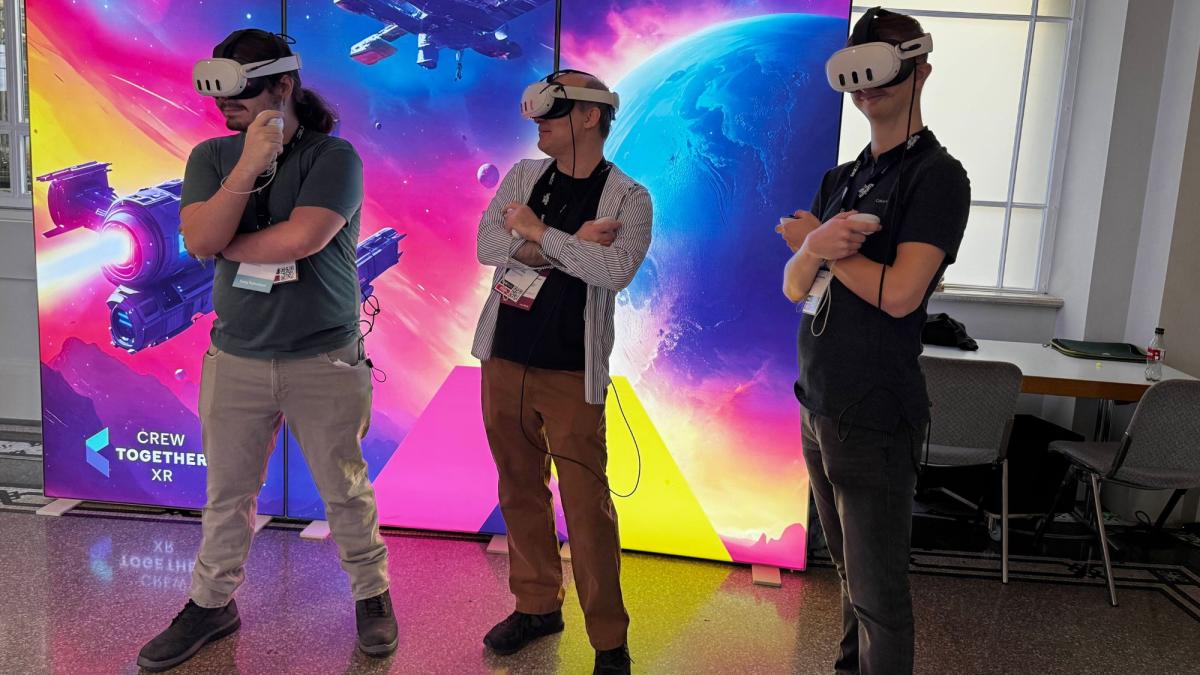
“The games and the overall experience were amazing,” Guida shared.
The students were able to see what’s possible and got a glimpse of where the industry is heading.
Pace students also staffed a university booth, representing Seidenberg and the larger Pace community to a global audience of professionals, educators, and students. Guida added that “it was great for our students to have the opportunity to represent Seidenberg and present the results of the Game Jam at the FMX educational fair, allowing for broader exposure and networking with industry professionals and peers”
As the Seidenberg students returned with new skills, broader perspectives, and playable proof of their creativity, they brought with them stories that extend far beyond the screen, ready to continue tackling real-world challenges.
The 'Realness' Key to Compelled Passcode Production
In his article, The 'Realness' Key to Compelled Passcode Production, published in the Journal of Criminal Law & Criminology (Vol. 115, 2025), Pace Haub Law Visiting Assistant Professor Gabriel Pell offers a novel framework for applying the Fifth Amendment’s Foregone Conclusion exception to compelled passcode entry.
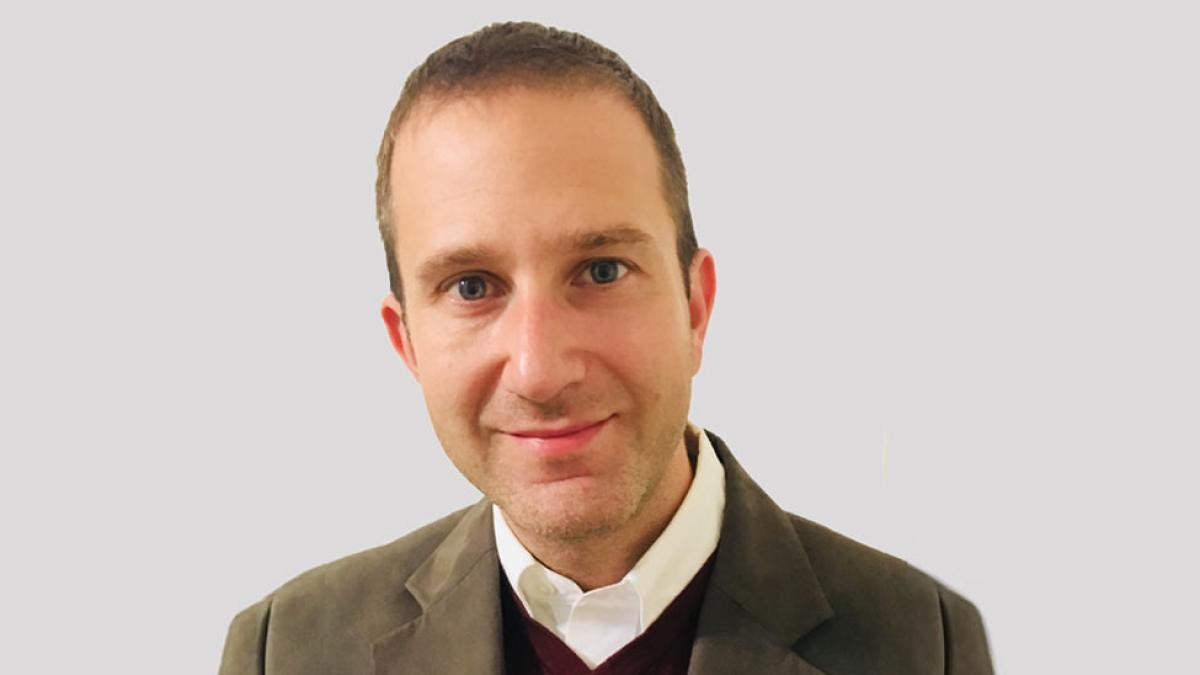
In his article, The 'Realness' Key to Compelled Passcode Production, published in the Journal of Criminal Law & Criminology (Vol. 115, 2025), Pace Haub Law Visiting Assistant Professor Gabriel Pell offers a novel framework for applying the Fifth Amendment’s Foregone Conclusion exception to compelled passcode entry. At the heart of the article is a key question: when the government forces someone to unlock a phone, are they permissibly being compelled to produce real evidence that exists outside of their mind—or are they revealing the contents of their mind in violation of their privilege against self-incrimination?
Drawing on the “act of production” doctrine, Professor Pell argues that where the average user experiences their passcode as something that exists outside of their mind, courts can conceptualize the passcode stored within a given device or the unlocked device itself as the 'real' evidence produced through compelled passcode entry. This conceptual shift can resolve a national split in authority among courts while protecting targets from compelled revelation of mere memorized information.
“[T]he government need not demonstrate pre-production knowledge of the contents of a locked device to satisfy the Foregone Conclusion exception,” Professor Pell writes, challenging assumptions some courts have made about the application of this paper-based doctrine to passcodes in the digital era.
Forward-Thinking Environmental Leader Michael Hamersky Appointed Executive Director of Pace Energy and Climate Center
The Elisabeth Haub School of Law at Pace University is pleased to announce that Michael Hamersky has been appointed to serve as the Executive Director of the Pace Energy and Climate Center. In addition to leading the Center, he will teach Natural Resources Law at the Law School. Over nearly four decades, the Pace Energy and Climate Center has established itself as a national leader working at the intersection of energy and the environment.
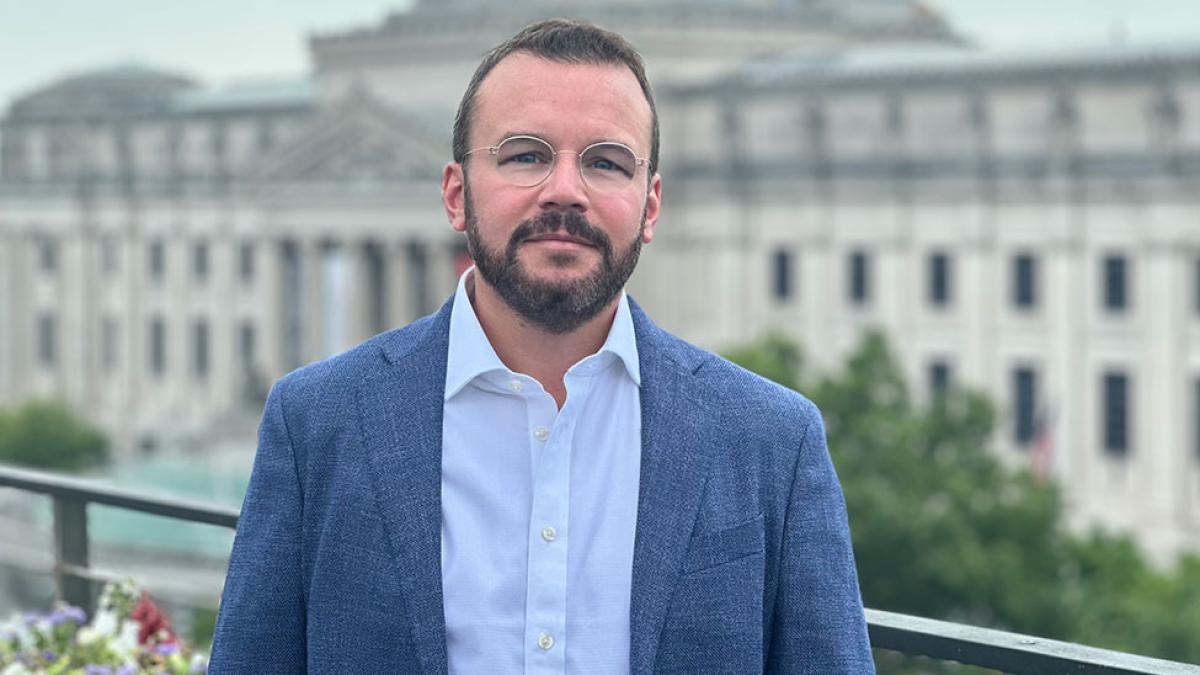
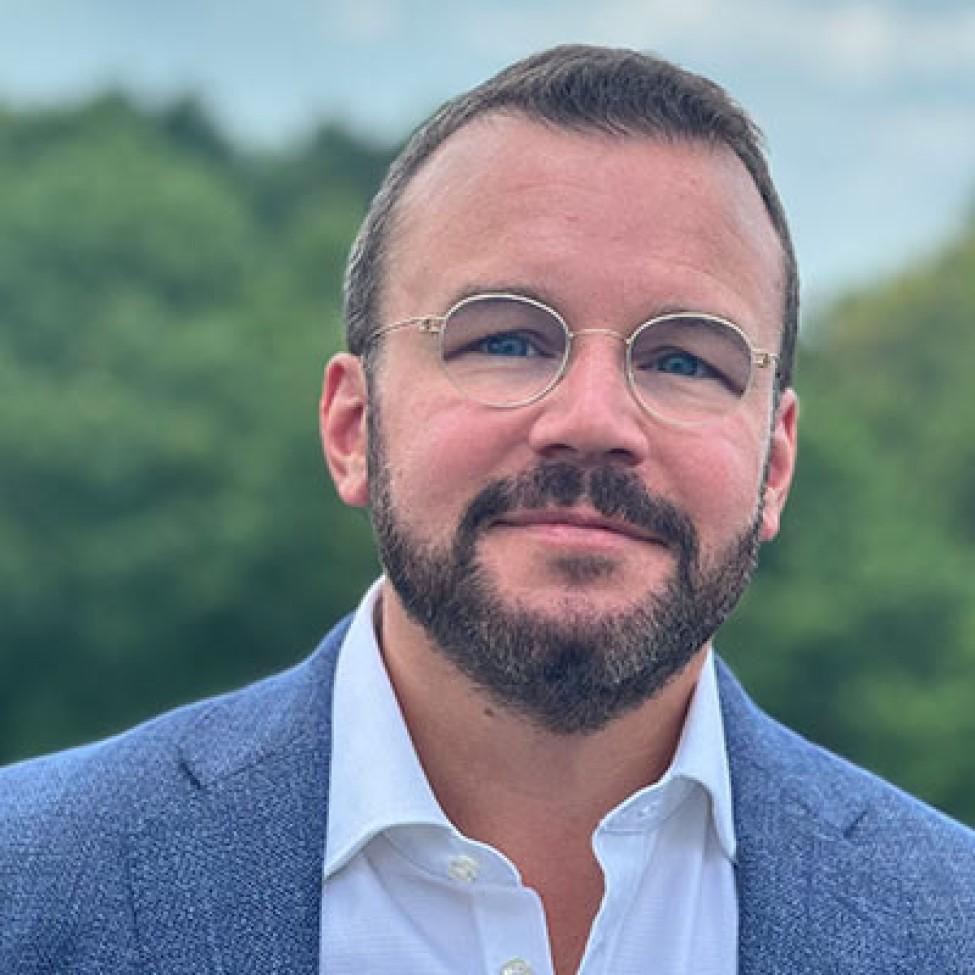
The Elisabeth Haub School of Law at Pace University is pleased to announce that Michael Hamersky has been appointed to serve as the Executive Director of the Pace Energy and Climate Center. In addition to leading the Center, he will teach Natural Resources Law at the Law School. Over nearly four decades, the Pace Energy and Climate Center has established itself as a national leader working at the intersection of energy and the environment.
Prior to this role, Michael served as the Climate Change and Land Use Policy Fellow at Pace Haub Law where he focused on the clean energy transition and the various barriers to, and incentives for, renewable energy deployment. Specifically, Michael has advised the United States Department of Energy, as well as end-users and municipalities, on how to best implement on-site distributed energy resources in the New York/New Jersey region considering the economics in light of regional energy markets. Michael has also developed recommendations to the New York State Research and Development Authority (“NYSERDA”) to update New York’s battery storage, and wind energy, systems model laws and has prepared resources related to large renewable energy project siting and permitting process, which is used by NYSERDA to educate municipalities throughout the state. Michael has also produced scholarship related to conservation in Indigenous communities and ocean governance.
“During his time at the Law School, first as an LLM student, and more recently as a Climate Change and Land Use Policy Fellow, Michael has established himself as a forward-thinking leader in the field of environmental law,” said Dean Horace E. Anderson Jr. “Our Pace Energy and Climate Center has established itself as a trusted Center and thought-leader, frequently engaging government decision makers and key stakeholders with objective research and analysis in law and policy. I am confident that with Michael serving as the Executive Director of the Center, our Center will continue to serve as a model and leader in the field.”
“I am beyond excited to join Pace Haub Law in this new capacity,” stated Michael. “I look forward to using this new platform to highlight the incredible work of the number one environmental law program in the nation’s talented students and to prioritize the Pace Energy and Climate Center’s work on the clean energy transition and the impact such transition will have on vulnerable communities.” Prior to joining the Haub Law community, Michael practiced corporate restructuring litigation for over fifteen years in New York City, and was an adjunct professor at the Fordham University School of Law. He received his JD from Fordham University School of Law and his LLM in Environmental Studies from the Elisabeth Haub School of Law at Pace University, with a focus on Energy Law and Climate Change.
I look forward to using this new platform to highlight the incredible work of the number one environmental law program in the nation’s talented students and to prioritize the Pace Energy and Climate Center’s work on the clean energy transition and the impact such transition will have on vulnerable communities.
—Michael Hamersky
Over time, the Pace Energy and Climate Center has grown from its initial focus on energy regulatory law and policies, expanding its focus to encompass transportation and fuels as well as climate change mitigation and resilience. Through the analysis and advancement of critical policies engineered to improve energy efficiency, accelerate renewable energy and distributed generation, reduce greenhouse gas emissions, and make our communities more resilient in the face of climate change impacts, the Center has continually reconfirmed its position at the leading edge of finding solutions to our energy and climate challenges on the local, state, regional, national, and international levels.
The Pace Energy and Climate Center was founded in 1987 as the Pace Energy Project by Dean Emeritus Richard L. Ottinger upon his retirement from the US Congress. Dean Ottinger recognized early on the significant environmental impacts of our supply and use of energy in the United States. From the very beginning, under Dean Ottinger’s leadership, the Center provided cutting-edge research and analysis of energy production alternatives’ social and environmental costs and benefits. Through careful and consistent engagement across communities, the Center was among the first organizations to highlight the benefits of energy efficiency and renewable energy as alternatives to conventional electricity generation.
In addition to being a force for legal and policy change, the Center also trains the next generation of smart energy leaders. Students from the Elisabeth Haub School of Law at Pace University are actively involved in the Center’s projects. Haub Law student interns contribute directly to the creation and development of work products for both domestic and international projects, building important professional skills in policy analysis, legal writing, administrative practice related to electric utility law, and other areas related to energy law.
Students who participate in the Center’s work have gone on to careers at institutions central to the energy discussion, such as the Federal Energy Regulatory Commission, the US Environmental Protection Agency, the Energy Foundation, the California Independent System Operator, New York State Energy Research and Development Authority, the New York Power Authority, the New York Public Service Commission, and the New York Independent System Operator, to name a handful.
Prior to Michael’s appointment, Elisabeth Haub School of Law Adjunct Professor Joseph Siegel served as interim Executive Director of the Pace Energy and Climate Center. Previously, Joe worked for 38 years at the U.S. Environmental Protection Agency, Region 2, office in New York where he was a Senior Attorney, co-chaired the Region 2 Climate Change Workgroup and the Office of Regional Counsel’s Climate Change Workgroup, managed the Region 2 Environmental Collaboration and Conflict Resolution program, and served on the Steering Committee of the Mid-Atlantic Federal Climate Partners.
Could Uncertainty in Higher Ed Be a Catalyst for Change?
Pace President Marvin Krislov opened this year’s Digital Universities US conference in Salt Lake City alongside Inside Higher Ed editor-in-chief Sara Custer, exploring how uncertainty in higher education could become a driver for positive change.